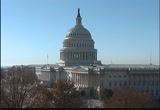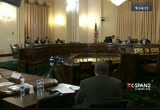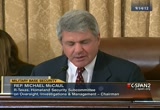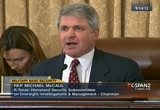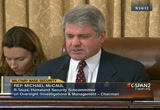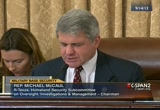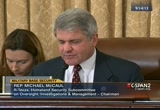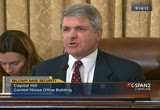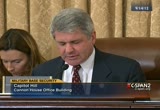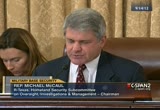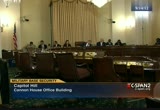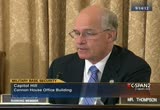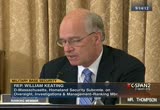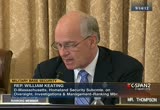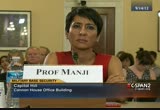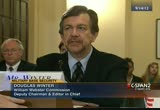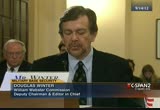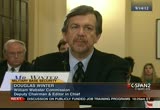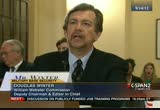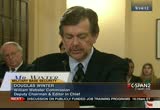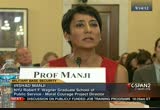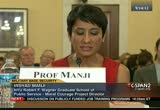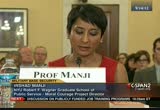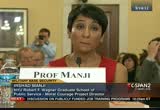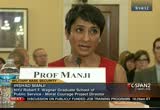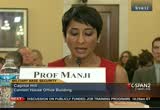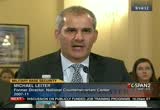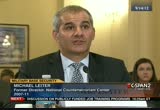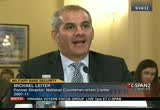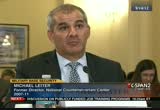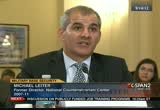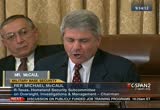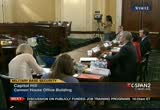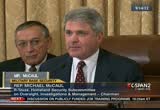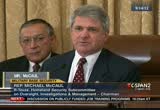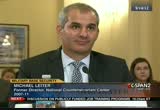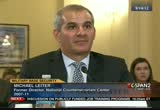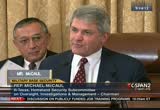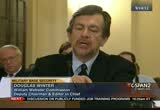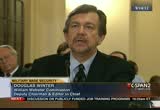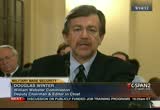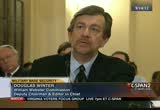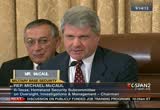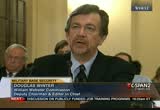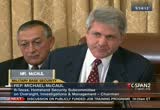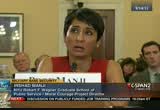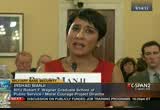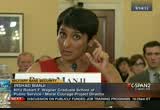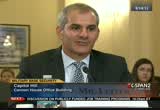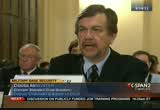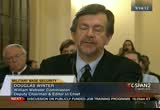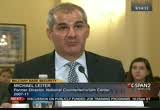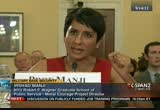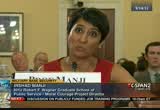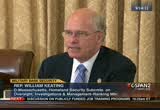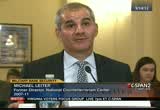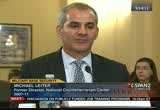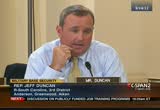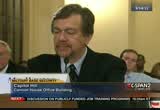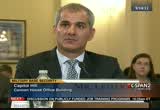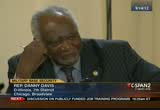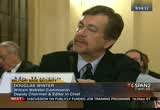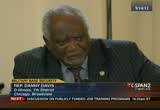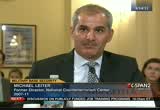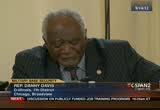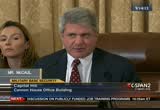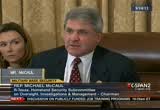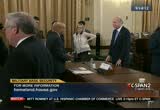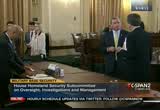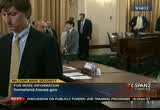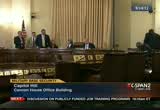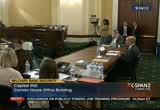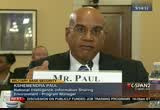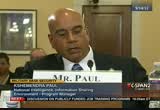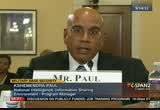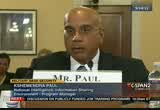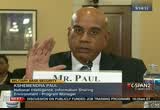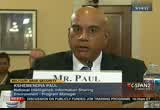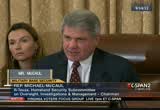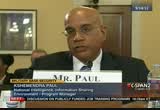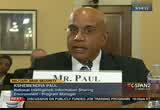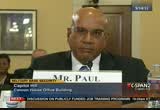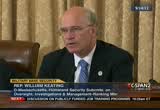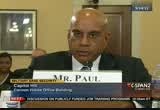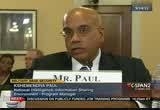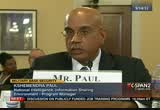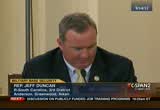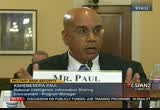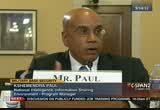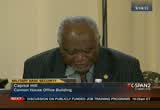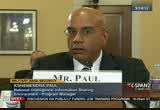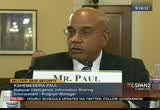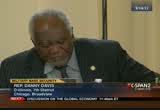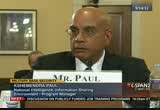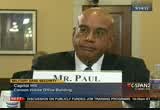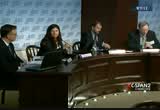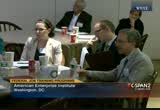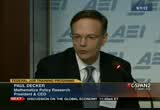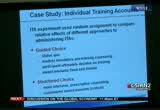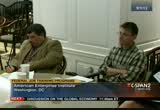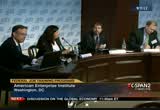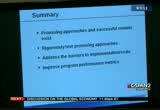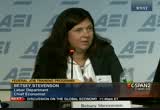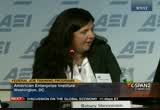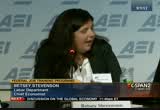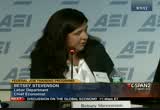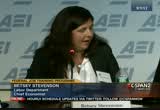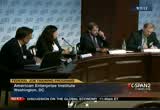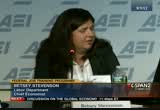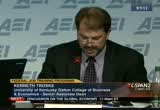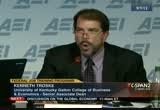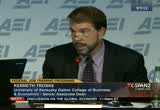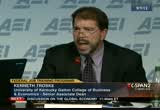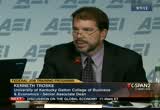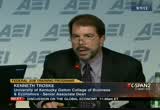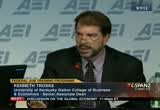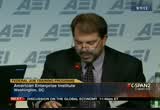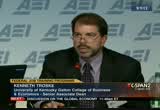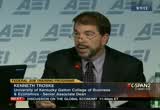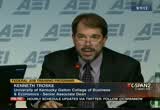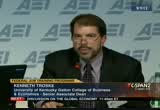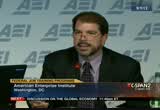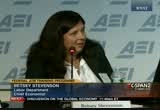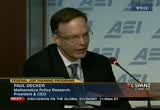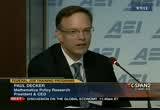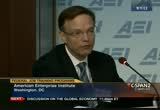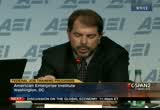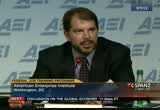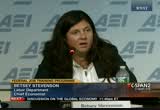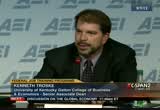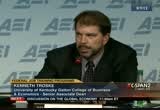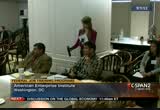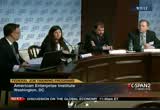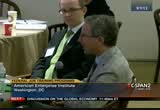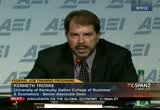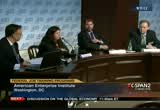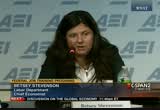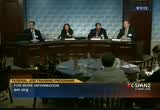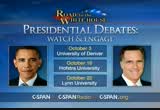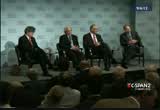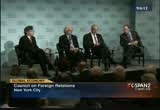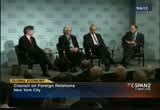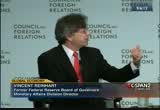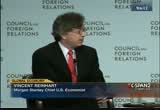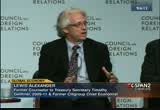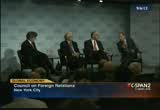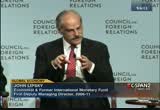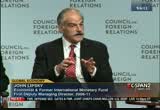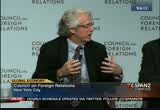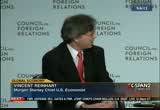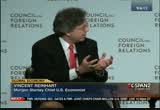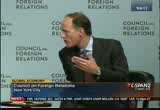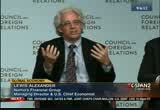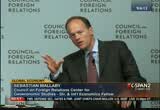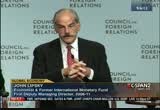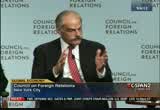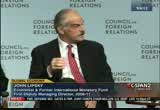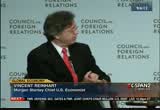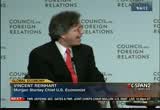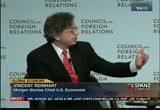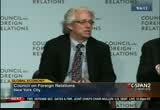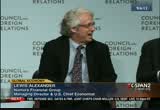tv U.S. Senate CSPAN September 17, 2012 8:30am-12:00pm EDT
8:30 am
at u.s. military bases. the former director of the national counterterrorism center, michael i'der, urged congress to improve counterterrorism investigation. this hearing was held to examine loopholes in various federal agencies that held to the 2009 -- led to the 2009 attack at fort hood, texas. in this hour and 50-minute event, he emphasized sharing among federal agencies to prevent terrorist attacks in the u.s. [background sounds]
8:31 am
>> [inaudible] the purpose of this hearing is to examine information sharing across relevant intelligence and law enforcement agencies, specifically as it pertains to the report issued by the webster commission. which focused on the fort hood attack. and as i mentioned, mr. winter, let me applaud you for your great work and, mr. webster, on that report. i now recognize myself for an opening statement. before we begin today's hearing, we should pay tribute to our brave diplomats who serve our nation abroad. unfortunately, one of our ambassadors, chris stevens, and three of his ceilings were killed -- colleagues were killed on tuesday, the 11th anniversary of the 9/11 attacks on the united states. these events and others should remind every american that we are a nation under siege and must remain vigilant, doing all that we can to uncover and take action against terrorist plots
8:32 am
whether the danger confronts us here in the united states or abroad. in june of 2009, fbi director robert mueller acknowledged the immense challenge facing the bureau stating: it is not sufficient for us as an organization to respond to a terrorist attack after it has occurred. it is important for us as an organization to develop the intelligence to anticipate a terrorist attack. developing intelligence, developing facts. in the past we looked at collecting facts for the courtroom. we now have to think of ourselves as gathering facts and painting a picture of a particular threat understanding the risk and moving to reduce that risk. and i couldn't agree more with the director's statement. and then on november the 5th, 2009, a gunman walked into the soldier readiness center at fort hood, texas, and shouted the classic jihadist term, allahu
8:33 am
akbar, and opened fire on soldiers and civilians. he killed 14 and wounded 42 others. this was the most horrific terrorist attack on u.s. soil since 9/11. today we will examine the facts of the fort be hood case as we know them -- fort hood case as we know them to understand how these facts that seem so obviously alarming now were so missed by seasoned professionals and to understand how the fbi and intelligence community as a whole can benefit from the lessons learned from this tragedy at fort hood. the suspect in the fort hood shooting is major nidal hasan, a commissioned officer in the united states army who openly communicated with a muslim cleric and number two terrorist, anwar al-awlaki. hasan characterized himself as a soldier of al la and who --
8:34 am
allah and who was assigned the task of counseling our soldiers coming home from the battlefield. let's step back in time and examine the facts. on may 31, 2009, hasan sent one of several e-mails to al-awlaki. one of the ones that i found most disturbing, and the e-mail read in part: i heard a speaker defending suicide bombings as permissible. he contends that suicide is we are missable in certain cases. he defines suicide as one who purposely takes his own life but insists that the important issues are intention. and then he compares this to a soldier who sneaks into an enemy camp during dinner and detonates his suicide vest to prevent an attack that is known to be planned the following days. the suicide bomber's intention is to kill numerous soldiers to prevent the attack to save his fellow people the following day. he is successful. his intention was to save his people, his fellow soldiers and
8:35 am
the strategy was to sacrifice his life. this logic seems to make sense to me, says mr. hasan. this e-mail telegraphs almost precisely what happened that fateful day. this e-mail was in the hands of the fbi before the attack. in another e-mail to anwar al-awlaki, hasan asks: please keep me in your rolodex in case you find me useful and, please, feel free to call me collect. so in december 2008 the fbi's san diego field office intercepted two e-mails from hasan and al-awlaki, and i did identify the e male as a product of interest. e-mail as a product of interest. over the next several months, e-mails were exchanged about how aggressively to investigate the hasan lead. in june of 2009, washington sent the following e-mail to san diego: given the context of his
8:36 am
military and medical research and the content of his to date unanswered e-mail messages from al-awlaki, wfo does not currently assess hasan to be involved in terrorist activities. the fbi agent in the san diego described the inquiry into major has saab as slim, quote-unquote. the case was dropped uil november 5th when the media began circulating reports of the massacre. at that time the san diego agents knew exactly who the perpetrator was saying, quote: you know who that is, that's our boy. years before the fbi knew of nidal hasan, the army major was being noticed by his superiors and colleagues at walter reed army medical center where he was a resident in the psychiatric program being trained to care for soldiers coming home from war. two fellow officers described hasan as a, quote, ticking time
8:37 am
bomb. during his medical residency and postresidency fellowship, hasan demonstrated evidence of violent extremism. on several occasions he presented sympathetic views towards a radical islam view and wrote papers defending osama bin laden. actions that enraged his classmates and professors, yet no action was taken. instead major hasan was rewarded for his work and promoted. his officer evaluation reports state, quote: among the better disaster and psychiatry fellows to have completed the master of public health at the uniform services university. he has a keen interest in islamic culture and faith and has shown capacity to contribute to our psychological understanding of islamic nationalism and how it may relate to events of national security and army interest in the middle east and asia.
8:38 am
these officer evaluation reports were inaccurate. these were all flags. none of which were acted upon. so many flags in this case. these reports did not present the facts about hasan's character. in reality, hasan was barely a competent psychiatrist whose radical views alarmed his colleagues. and the irony to me is this is the very man who was to counsel our soldiers coming back from the field of battle. in the hasan case, both the fbi and dod had important pieces to the puzzle that it put -- that if put together, maybe, could have possibly saved the lives of 12 soldiers and one civilian. i want to personally express my sympathy to those impacted by the terrorist attack at fort hood. we should treat those who died
8:39 am
and who were wounded as brave americans and a award each of them a purple heart medal. and when i spoke with the victims' families at the fort hood memorial service, i saw firsthand the outrage and loss they felt, and i wanted to help them find answers. but i want these answers to serve as a catalyst to effect change and improve our intelligence commitment as a whole -- community as a whole so we can stop these attacks before they occur. and we have had great successes. we do look forward to hearing from the witnesses' testimonies to better understand what went wrong in this case and how we can prevent such a tragedy from occurring in the future. and with that i now recognize the ranking member, the gentleman from massachusetts, mr. keating. >> thank you, mr. chairman. and as we all pause to think of the families of the four americans who were lost just this week in libya and keep their families in our prayers
8:40 am
and thoughts, it is significant that we come here today in dedication to find every piece of information we can find that will determine how better to keep the americans that serve us so well safe as they try to keep us safe. so with that, mr. chairman, i thank you for o holding today's hearing. three years ago on november 5, 2009, the nation was shocked by the maas shooting -- mass shooting that occurred at the army deployment center located at fort hood, texas. during the shooting 13 lives were lost, 43 individuals were wounded, and the lives of so many others were forever changed. it later became evident that the warning signs existed well before the tragedy and should have at a minimum been further investigated. both the fbi, the department of defense had knowledge of major hasan's potential as a threat to homeland security.
8:41 am
the actions leading up to the massacre by major nidal malik hasan, is sole suspect, should have unequivocally sparked a greater concern, yet dots were not connected, information was not shared, and the lack of formal policies and protocalls -- protocols led to a colossal breakdown in communication. in december of 2009, the webster commission was created to examine the events that occurred before and after the shootings. the final report of the william h. webster commission on the fbi cowns terrorism intelligence and the events at fort hood, texas, was released in july of 2012. the crucial recommendation mirrored in both the webster commission's report and the 9/11 commission's report focused on the importance of information sharing to our nation's security and the need to do away with the culture of territorialism that
8:42 am
existed between the various levels of federal, state and local authorities. as a former massachusetts district attorney myself, i was once at the bottom rung of the information-sharing ladder and understand the consequences of inadequate lines of communication. for this reason my first legislative measure was that -- signed into law was an amendment to the intelligence authorization that encouraged federal authorities to utilize fusion centers and list all of the intelligence capabilities including that of the law enforcement to secure our homeland. since then i've been following the progress of the recommendation set forth in the 9/11 commission, and now the webster commission in regard to intelligence sharing and am pleased that the administration has indicated that effective information sharing and access throughout the government is a top priority. this all being said, i'm interested in hearing from both our witness panels today on their thoughts and their own
8:43 am
recommendations, and with that i yield back the balance of my time. >> i thank the ranking member. we're pleased to have a very distinguished panel of witnesses here today, and i'd like to introduce them. first, we have mr. douglas winter, deputy chair and editor-in-chief of the william webster commission. he's counsel and former partner in the law firm of brian cove where he is the head of the firm's electronic discovery unit. he's served as a law clerk to judge william webster on the u.s. court of appeals for the 8th circuit, also served as a captain in the army and is a graduate of the u.s. judge advocate school. second we have ms. maji, director of the moral courage project at the wagner research center for leadership in action. she equips students to become global students by speaking truth to power in their
8:44 am
communities. as a reform isthmus limb, ms. maji has written multiple books on the trends that are changing in islam. and it's so great to have you here. and finally i'd say my colleague and friend from department of justice, michael leiter is senior counsel to the chief executive officer of -- [inaudible] technologies and the former director of the national counterterrorism center. it's great to have you here today as well, mr. leiter. the chair now recognizes mr. winter for his testimony. >> [inaudible] i am joined today by adrian steele, the commissioner who was responsible as governing authority easley yeason with the department of justice and the fbi and also staff member george murphy. it is impossible in the time allotted to describe the lengthy and detailed investigation that
8:45 am
is set forth in the final report. director mueller's terms of reference were extraordinary in scope. the factual background, as you know, is intricate and complex. there is no simple calculus of cause and effect here. the mistakes and shortcomings we identified were the products of cascading sets of circumstances that ranged from a hack of policy guidance -- lack of policy guidance, training and adequate technology to a misleading set of army personnel records and an error in interpreting an abbreviation. my written statement sets forth an overview of our analysis and our findings. today i will devote a review of the recommendations to help underscore the lessons of fort hood. ..
8:46 am
>> there's assessments of law enforcement personnel and other government personnel. when judge webster was sworn in as director of the fbi, there were three analysts at the fbi. today, the fbi has more than 3,000 intelligence analysts with established career paths. we applauded the fbi's success in embedding analysts and recommend further integration of
8:47 am
analysts into further fbi groups. a crucial lesson of fort hood is the ever-changing diversity and complexity of communications technologies, and the impact of the ever-growing amount of electronic information on the fbi's ability to identify and combat terrorism. these changed the ways in which the fbi will in the future need to acquire, store, review, manage, decimate, and act on intelligence. we recommended that the fbi expedite and seek expanded funding for enterprise data management programs with an emphasis on aggregating its primary aggregate of data bases collecting and storing data as a separate storage and sharing it across the u.s. intelligence community. we recommend the fbi seek funding for acquisition of new hardware for the edms data
8:48 am
system lacking the infrastructure to fulfill system demands and lacks a live disaster recovery backup. only two people, an fbi agent and analyst, were charged with reviewing information in the al way ky information. the confronting amount of information, the limited technology, and other factors forced the two people to review the 18 communications with 20,000 other items they reviewed. we recommended the fbi evaluate or require information technology that was automated and advanced that would assist personnel in reviewing and managing data. we also recommended that the fbi implement managed information review protocols for these large data to allow for case specific reviews that occurred in the
8:49 am
alwaki investigation as well as different review teams. an important reminder of fort hood is that congress, the justice department, and fbi has to ensure the fbi's governing authority strike an appropriate balance between preacing civil liberties and privacies and detouring threats, and we recommended among other things they have to increase reviews and audits and exists authorities should remain in effect. training, we learned, is crucial, especially in the task force context with a diverse number of state, local, and triball agencies. those who conducted the assessment in the washington field office did not know the dwyedms data base existed leaving him and the fbi supervisor to believe there were just two communications between awlaki, and rerequire task force
8:50 am
officers to complete data base and computer training before they join the terrorism task force. in closing, i want to note that the final report focuses on what went wrong. throughout our investigation, we were witnessed to all what was right about the fbi with patriotism, dedication, and long hours of work in a context of constant threats and limited resources. agents, analysts, and task force officers are confronted with decisions every day whose consequences may be life or death. these personnel need better policy guidance to know what's expected of them, better technology, resources, and training to navigate the ever-expanding flow of intelligence information. they also deserve our gratitude. thank you. >> thank you, mr. winter. >> thank you, good morning. [inaudible] i'm here in capacity as founder
8:51 am
and director of the moral courage project. before i begin, allow me, also, to express sympathy to those, both american and not, who have been victimized by this week's violence in libya egypt, and now yemen. housed in the wagner school of public service, the moral courage project teaches people worldwide to speak up when others, frankly, want to shut them up. we are motivated, not just to break silences, but also to combat the abuse of power. in other words, the corruption that comes from the fear of speaking out. this means understanding why silences develop in the first place which brings me to the question that concerns our hearing. let me be clear.
8:52 am
i do not know if one or more fbi officers intentionally withheld information about major nidal hasan, but personal experiences leave me skeptical whether the bearers are willing to share vital information whether with the public or with each other. i will give you a couple of examples in a moment. first, let me address why i would have perm -- personal experiences on this front. the reason is i'm a devoted muslim who loves god, and because i love god, i speak up whenever anybody uses islam to violate all of our god given liberties and human rights. as refugees from east africa, my
8:53 am
family and i settled on the west coast of canada, and there, i grew up attending two types of schools. the multiracial, multifaith public school, and then every saturday for several hours at a stretch, the islamic religious school. at that school, i asked candid questions. for instance, why can't muslims make jews and christians as friends? at the age of 14, having asked one too many of these questions, i got booted out of the ma madressa, but as i i sured my mother more than once, leaving madressa does not mean leaving allah. i discovered there has an islamic tradition of questioning, reinterpreting, and
8:54 am
even of decenting with the clerics. it is this tradition that empowers me to reconcile my faith with freedom. all of which puts me and my team on the receiving end of death threats and actual violence, not just in muslim majority countries, but also in this part of the world, and that is why i have firsthand experience with some of the interworkings of national security. that is now i have come to observe the censorship that plagues many good people, people to whom we do owe gratitude and whose mission is to protect the public. in my remaining time, i'd like to share two stories. although the first takes place in canada, of which i remain a citizen, it foreshadows the
8:55 am
second story, which takes place in the united states, where i now live and work. in june 2006, canadian police arrested young muslims for plotting to blow up parliament and be head -- behead the prime minister. they called it operation bader. b-a-d-e-r. operation bader is a tribute to the battle of bader, the first devicive military victory by the prophet muhammed. police knew they helped inspire the toronto 17, and, still, at the press briefing, police did not mention the words "muslim" or "islam," and at the second
8:56 am
meeting with the press, the police boasted, bragged about avoiding the words "muslim" and "islam," again, knowing operation badr had been organized in the name of islam. three months later, at a police conference, i raised my concern about the silence. after my plea for honesty, several law enforcement insiders independent of each other confided to me that the lawyers prevented these authorities from publicly uttering the words "muslim" and "islam." as for my experiences in the united states, there's a concrete one. in 2009, i received media calls about deefd heedley, a u.s. citizen who helped plan the terrorist attacks on bombay in
8:57 am
2008, in other words, the year before. apparently, he named me among his targets too. journalists wanted to know how that made me feel. you can guess my response. what made me feel worse, though, was that the media calls came in a full day before any national security officials got in touch. somehow, somewhere, their chain of communication had broken down. the research on institutional silos and silence suggests multiple forces at play. the antedote to all of the forces is moral courage, the willingness to speak up when others want to shut you down. i thank you for this invitation,
8:58 am
and unlike my madrassa teacher, i welcome your questions. >> thank you, professor. we appreciate your courage. thank you for being here. >> it's a pleasure to be back, my first appearance before the congress outside of the executive branch, and i have to say the freedom is rather invigorating. today, i'm actually appearing as a member of the homeland security project at the bipartisan policy center, the follow-on organization to the 9/11 commission led by the distinguished and talented governor tom kaine and thomas lee hamilton, and my comments are based on the time over four years, head of the national counterterrorism center as well as receiverring in the navy and -- serving in the nay and department of justice. i want to focus comments on where i think there are still challenges that the congress and the executive branch faces over
8:59 am
the next several years, but i do want to highlight because you're focused on a failure, you noted the successes, and there's really be many, and we take the successes for granted today. the fact we have a single consolidated watch list at the counterterrorism center, and a variety of systems with variety of organizations all in one place, we have 104 joint task forces and fusion centers, none of this is to say that the problems are solved, but this is to say that the improvements are quite tremendous, and the tragedy of the 13 brave americans lost in fort hood can never be eliminated. all of that being said that we have avoided large scale terrorist attacks on the united states and a total of 14 individuals killed in the united states in the past 11 years is, in my view, nothing short of remarkable. tragic to every one of those lives lost, but a record, which
9:00 am
i do think that the congress and u.s. government and our allies can, in fact, be proud of. now, having accepted that not everything is right, i would offer two caveats before i go into the areas where i think they can be improved. first, i think the congress and the executive branch must be very careful not to conflate all information sharing problems as being the same. there is real sophistication in this. what happened on christmas day, an intelligence failure, was one type of information challenge, and it's a very different challenge from what happened at fort hood. i say that because i think it is important to, as i say, "get under the hood" and examine these with specificity. the committee knows it well, but we have to continue to remember that information sharing is not always unmitigated good. we need look no further than wikileaks to remember that as we
9:01 am
share information, we must also do it in a way that not only protects privacy and civil liberties, but the security of the information. i believe these two things can be reconciled, but we can want forget there -- cannot forget there are dangers as well. very quickly, where do i see opportunities and need for improvement? i'll divide that into five basic areas. legal, policy, budgetary, personnel, and technology. first, on the legal front, i am a recovered lawyer, but i will say there's no area in which i worked in national security where the legal -- the legal landscape is a myriad of complicated, conflicting statutes, and it is extremely difficult to ever know how information can or cannot be shared, and the burden that puts on operators and analysts, not to mention lawyers, is tremendous. although i think the foreign intelligence surveillance act serves a valuable purpose, both
9:02 am
for collection and protection of civil liberties, anything congress can do to simplify the law, especially in an area of rapidly changing technology, would be critically important. second, on the policy front, i think it is important that the congress and the executive branch work together to move legal policies -- pardon me -- move information shares policies in a far more rapid way than they move today. i think it's a general matter, an i say this having serving in the republican and democratic administration, i think it's a general matter. administrations have gotten the policies right about how information should be shared, but the pace at this these discussions occur borders on the biblical, and in an era of rapidly evolving terrorist threats, we cannot allow the discussions to go on endlessly. they have to demand the executive branch rapidly adopt
9:03 am
policies to ensure there's information sharing once laws are passed. on the budgetary front, this committee knows quite well the pressures that all of national security, state, and local governments face in the coming years. we spent an enormous amount of money building task forces. in my view, although they have done well as we enter a more austere budgetary period, the congress has to look quite closely on how to rationalize and truly create a national system, and not simply a patch work of entities. very quickly on the last two points, personnel and technology. i think part of the failure at fort hood was undoubtedly a thorough understanding among some well-intentioned agents and officers about what were signs and symptoms of radicalization in the population. this sort of training must be continued, and, of course, training on the tools that people already have must be increased. last, but not least, technology
9:04 am
can help us here. we all know that technology is not a panacea, but basic technology tools, which flag information for people, allow uncorrelated information to be shown to a variety of individuals, information to be shared across the security regimes, amongst the fbi, national counterterrorism, department of defense and the like, are critical. it is not simply two agents looking at an e-mail trying to decide whether or not individuals radicalized, but taking full advantage of the larger national security community and technology exists to do that today. with that, mr. chairman, i welcome your questions. it is very good to be back, and i want to simply goes on joining you on your notes of condolences for the losses in libya, losses every day in afghanistan, and the losses in fort hood. >> thank you, mr. leiter, and i look forward to hearing answers
9:05 am
to my questions without being under the constraints of the federal government on top of you. i want to enter a statement from the william webster, the chair of the webster commission. hearing no objection, so ordered. i want to just show, not for any reason other than this is taken the day of the memorial service at fort hood, and you can see -- i was standing here -- you can see the boots, the rifles, the helmets, really gives you a graphic picture of what really happened that day. you can see one of these soldiers on crutches. i asked him, what did he say when he shot you? congress mapp, -- congressman, he said, god is great. the classic jihadist terminology. i realized at the moment it it s not a workplace violence
9:06 am
incident, but it was something more, in fact, an act of terrorism. i was criticized at the time for saying that. i think history will judge that as a correct assessment of what happened on that fateful day. mr. leiter, i want to start with you, head of the nctc, you are really the expert at connecting the dots, and you did perform a masterful job while you were there. you and i worked with joint terrorism task forces. they have an enormous challenge, enormous amount of data that comes through, many of which, you miss one thread of evidence, you can be held accountable by members of congress like myself in a later hearing, but these e-mails, the 18 e-mails that took place, when we were briefedly senior intelligence officials, and they didn't give us the content, just simply say -- the only word i can use is "down play," the significance
9:07 am
of the e-mail. finally, when the good work of the webster report revealed these e-mails publicly, we all had a chance to actually read the content, and the ones i described in the opening statement, may the 31st of 2009, major hasan is almost telegraphing what he's about to do, asking permission from awlaki in yemen if it's okay for a suicide bomber to kill soldiers and innocent civilians in the cause to protect our fellow brothers? you know, you and i worked in law enforcement. this is one of 18. the other one, you know, here's keep me under rollandex. to me, this is a huge deal. it was a big deal in san diego. they thought, wow,ñi there's something wrong going op here. when need -- it's a lead, have
9:08 am
them investigate. the response from is astoppedding that while we don't really see a terrorist threat here, and they basically shut down the investigation until five months later after which hasan killed 13 people, 12 soldiers. there is a department of defense official on the committee, and yet they didn't contact fort hood. maybe it's the legal restrictions you're talking about so we need to change that. there's so many flags not only between the fbi's two offices, and i commend the san diego office for their courage and bravery of trying to get to the bottom of this. i faulted wfo office for not following up on this, and in the military, the way they passed this guy along knowing he's
9:09 am
prophetizing radical islam, but they want to pass him along, promote him, send him down to fort hood so that -- so many flags in this case. how could -- the dots were identified, but they were not shared. how did this happen? >> well, congressman, i will say that i agree with you that it did not take long from my perspective to know this was an act of terrorism. in fact, national counterterrorism center within a week of the event entered this into its worldwide data base of terrorist events based on preliminary reports, and that was not a conclusive legal judgment, but all indications were this is terrorism. i think in temples of the -- i think in terms of the information that is not shared, you had a break down along so many angles.
9:10 am
the san diego team, i think, did a good job, and i defer to mr. winter who knows the details better than i, but they were not even aware of all of the e-mails. they were not aware of the department of defense information. wfo was not aware much of that, and it was handed to an officer that frankly from an outsider's perspective, i think, didn't really have a strong understanding of the signs of radicalization. the two points i make quickly in defense of how this evolved is one we do have to put ourselves back in 2009 to recall who awlaki was then and who he is perceived today. we understand him to be an operational leader that the way in 2009 we did not. it is not an excuse, but it is some color. the second piece is, from my perspective, congressman, the idea that people would not go talk to him. i do not understand.
9:11 am
i do believe that if that information were shared with a broader group who understood radicalization, there would have been increased pressure from headquarters to make that happen, and that would have led to, i believe, a better outcome. i couldn't agree with you more. i talked to the commanding officer in fort hood, and wouldn't you like to have known this? yeah. i understand it's complicated, you don't want to shake down someone. they could have at least watched him, put him under surveillance, and just maybe that would have stopped what happened. my time is limited. i want to go to mr. winter. eighteen e-mails, wfo just has two e-mails. some technology breakdown occurs where they are not even aware. they don't even know how to access to get the remaining e-mails, and i have to say, mr. leiter, a former justice department official and myself, this may 23rd or may 31st
9:12 am
e-mail, if you read this, would that concern you? >> gosh, i look at one e #e -- e-mail and the body of the e-mail, it's a clear indication he's radicalized, but whether he's mobilized, that's a hard call. >> asking permission to perform a suicide bombing mission against soldiers and civilians at a dipper -- >> that's with i said, congressman, i want someone to go out and interview the guy who has clearly been radicalized. >> that should have happened in this case. mr. winter, what happened here? >> decisions made in wfo were based on a set -- >> your microphone. sorry. >> i'm sorry. belter? >> yeah, it is. >> the decisions made at wfo were the result of truly a cascading set of circumstances. san diego sent this lead based on the first two e-mails that were acquired from hasan to
9:13 am
awlaki. there was no fbi policy on the assignment of these types of leads or on taking actions on these types of leads. the supervisor in wfo waited 50 days after the arrival of the lead to read it and assign it. he assigned it to a dcis agency, a task force officers who waited 90 days from then to read it and to act on it. under informal fbi practice, agents had 90 days to work on leads to elevate them into investigation or close them down. this agent read that lead and agented on it on the last day under that fbi practice, and, indeed, conducted the assessment in four hours on that day. it was rushed. there was that pressure that was created by their workload and the late assignments. he consulted u.s. army
9:14 am
electronic personnel files on major hasan, the entirety what he could have access to from the jttf. that meant he received a brief and highly misleading set of personnel records that indicated that major hasan had a security clearance, he had been promoted to major just ten days earlier, and his supervisors praised him thoroughly. the only negative in the 8 # 0-some pages, i believe, was that he failed his pt test. >> they -- >> they praised his research on islam in the military. now, hasan used his real anytime in communicating with awlaki. he was not anonymous. the agency concluded this was part of hasan's research in the military, and that the military approved of it. at the same time, there was no
9:15 am
fbi policy on what's called baseline collection plan. that policy was instituted in september 2009 after this investigation, but before the fort hood shootings. that created a minimum of what agents are meant to collect when conducting an assessment. if that plan had been in effect then, this agent would have been required to consult the bwsedms system, a computer base on which all of the messages from hasan to awlaki were stored, thus, he would have known of that and requiredded to search it, but he was not trained on that data base. e 4e didn't even know it -- he didn't even know it existed. he believed there were two e-mails, sent in december 2008 and january 2009, which was five months prior, and that awlaki had not responded. his supervisor concluded that hasan was not involved in,
9:16 am
quote, "terrorist activities." now, did that resolve the question of whether or not hasan was a threat? we didn't believe so. we felt that this decision making process was flawed and they should have conducted an interview of hasan based solely on the information they had at that time, but i'm not defending the decision, but explaning it. you can understand how reasonably these men could have been led down this path by the combination of all of these circumstances, some self-imposed, others the result of the lack of policy, others the result of the inability to gain access to the records that walter reid, for example, had. >> i think those problems need to be fixed. i will ask you this question. do you believe -- i believe that gross errors were made in this matter that resulted in 13 people being killed, 12
9:17 am
soldiers. should anybody be held accountable within the federal government? >> on our review, we were specifically asked by director mueller whether any action should be taken, we found mistakes made, but the individuals agented with good intent, agented mostly reasonably under the circumstances, and they were not individually responsible for some of the decisions that occurred because of the lack of policy direction for example. one of the reasons we advocated the seven policies that we recommended was that if those policies had been
9:18 am
>> my time is running short. they indicated the san diego office called wfo, and the response back is, look, we don't want to damage his stellar career, and something to the effect of this is a politically sensitive matter. that was not corroborated by the wfo office; is that correct? >> that's correct. >> according to san diego, that conversation took place. >> the first part you said is corroborated, that wfo advised san diego twice that they did not believe an interview was appropriate because that would damage him in terms of his position in the military, the chain of command would not take it lightly. >> i do think the american people and the families and the victims deserve that somebody in this government be held accountable for what happened. professor, i want to ask you real briefly with my limited time left, you spoke very eel --
9:19 am
eloquently of your fear of speaking out. within the department of defense, you know, we have this individual that various colleagues saw warning signs popping up calling him a ticking time bomb, talking about bin laden, business cards saying soldier of allah. indications are there, no onements to speak out, there's a fear of retribution in the army, and he's passed along. is this a case where political correctness was more important or overshadowed national security? >> sure sounds like that. if you can hear me, sure sounds like that -- thank you. sure sounds like that, congress mapp, and frankly, i think it would be fair to ask if political correctness also crept
9:20 am
into the fbi. for example, we spent the last several minutes talking about how somebody at the san diego office of the fbi had a troubling lead, passed it on to the washington field office after which it went nowhere, and one of the questions i have as i'm listening to these other testimonies is why did the san diego officer not stand up when it became clear to him or her that -- that an obviously unsettling lead was not going to be acted upon? now, one can argue, well, it's obvious why people don't stand up in general because doing so invites complication in your life, and life is complicated enough, thank very much, but this is where i believe we can actually learn something about a mechanism that the department of state has put into place, and that is a mechanism called the
9:21 am
decent channel, and it was actually introduced just after the vietnam war whereby foreign policy officers when they see the chain of command is going to be resisting their defense with group sync, the settle consensus accepted for too long within the cozy confines of that department, they can actually use this channel to explain why somebody higher up needs to hear a counter argument, and they do not have to get permission from the higher ups in order to be heard through the channel. i don't think that exists either at the department of defense or at the fbi. it's something well worth invest -- investigating whether it works as it did, by the way, in the
9:22 am
leadup to the bulkan genocide, and the secretary of state herd a dissenting vice -- voice through the channel and realized the united states must intervene. it was through that -- that, i think, we can learn a little bit more about how dissent can be institutionalized so it is constructive rather than chaotic. >> excellent point. the chair now recognizes the ranking member. >> thank you, mr. chairman, and i think you've done a good job of looking historically at this. i want to come at this from a different angle, maybe ask mr. leiter first. i've heard about the policies. i've heard about some of the changes. could this, under the same set of circumstances, happen today? >> congressman, you'd have a slightly different set of facts
9:23 am
that would not put the policies put in place, but i think that there are -- >> all right. just the circumstances. >> i think it's less -- the more is looks like this circumstance, the less likely it's going to occur. could something like this fall through the cracks? >> absolutely. i still believe there's information not being sharedded effectively and quite often that information is about u.s. persons, which is appropriately the most protected set of information, and the congress and the executive branch must ensure that information is effectively shared so as the professor very ably said, you can get second and third opinions, and you aren't simply forced to take the views of one operator's or one analyst about whether someone is a threat. >> mr. winter, could this still happen today? >> absolutely. i agree with mr. leiter. the closer the circumstances, the less likely it is to.
9:24 am
because of the policy changes and sensitivity to the issues, for example, two of the our recommendations concern putting the fbi putting into place a clearinghouse process by which it currently has with the dod, by which it advises dod through headquarters, the national joint terrorism force, about dod personnel in the military. we recommended that similar clearinghouse procedures be adopted for law enforcement agencies, whose members may have equal if not greater access to weapons and intelligence nan military members, and also as to other departments of the federal government so that if someone at the state department is under investigation, there is a mechanism in place for the invest gaiting officers to move that up, not only up the fbi chain of command, but move it to the state department chain of command and their investigators so all individuals can work together to detour the potential
9:25 am
for terrorism. however, obviously, outside of government hierarchies, the possibilities for individuals like major hasan to take these actions exist, and it is difficult for the fbi to be -- have constant knowledge of the whereabouts and attempts of those types of individuals. >> well, one thing that -- i was not going to ask it, but you sparked the interest, and i asked it before, that general information, whether it's state or local officials usually, how is that inhitted by not having a integration policy in the state? if people see things, want to come forward, how do they come forward if they are going to effectively make themselves criminals? how weak is that in the initial information? >> that's something slightly beyond my pay grade sir. i'd try to answer in in fashion,
9:26 am
however. the fbi has in place what's known as an e-guardian system, an electronic version of the guardian system by which individuals who bring information to local law enforcement agencies let's say, even anonymously, tips and the like, can be forwarded on immediately and promptly by electronic means, and acted on reviewers and analysts i think within a short period of time. >> congressman? >> yes. >> i think interaction with immigrant communities is critical, and in the counterterrorism context, obviously, what we're most focused on is american-muslim communities, may or may not be immigrant communities, but engagement by the fbi, department of homeland security, immigration, and state and local officials is muslim-american communities is critical to occur, not just for law enforcement and intelligence,
9:27 am
but good government and engagement. i will say congress has an important role in that regard that when the first does engage the muslim communities that they are not immediately second guessed about which muslims they talk to. it is very important for them to have wide engagement to understand these communities and potentially identify individuals who are radicalized, and they have to give the executive branch a reasonable room to ma -- maneuver to do that and find problem areas. >> yeah. >> may i add something in my own regard? >> briefly. >> sure. the problem is that too often, especially in this country, we stumble over ourselves to try to identify who are the moderates and who are the extremists, and i argue to this gentlemen this is the wrong distinction. the better distinction to make
9:28 am
to get at the heart of the matter is who are the moderates and who are the reformists? moderates, for example, don't much differ from extremists. in that, moderates are so consumed with what they perceive to be western imperialism, israel, america, so forth, that they distracted themselves from dealing with the imperialism within their communities. those clerics, those supposedly secular civil leaders who insist that good muslims remain silent when crime such as honor killings happen within their communities. we need to ensure that we get the framing here right if you're actually going to hear people who are willing to step forward, but they're not going to be willing to step forward, congressman, unless they know you got their back, because they know what backlash comes their
9:29 am
way by virtue of opening their mouth. >> thank you. i want to get back, and one of the concern, mr. leiter, is you used the word of the necessity of having a national system rather than a patchwork system. we can have the greatest information in the world coming forth, but if we don't have a way to process that in the national basis. can you talk specifically what you meant when you said that? how far along -- all of dhs is patchwork as far as i'm concerned. amazing we have not gone past jurisdictional issues, but, to me, that has to get fixed first. now, i know we have budgetary issues in front of us, but that's not fixed, and that's not a priority, what good does all of this gathering of information -- what good is it? when you said that, you know, i think that's a priority that we
9:30 am
have to have, and what budgetary issues are confronting that, and what actual technology issues or interaction issues with different levels of intelligence? you know, expound on that. >> absolutely. congressman, as both you and the chairman know well as attorneys, we live in a fedderated system. this is shared with the department of homeland security and the fbi for the jttfs, but what we have not done is created a system where you can actually effectively compare that information across state and local fusion centers, across jttf. the fbi took a value l step in the past year which is to move to a regionalized structure. i don't believe you can have any system with 104 jttf and 50
9:31 am
#-plus fusion centers and see correlations effectively. regionalized intelligence structure, where you have -- i believe six or eight regions -- looking at the various fusion centers and jttfs and seeing where there's suspicious activity, and then having the cases managed by the fbi headquarters, in coordination with dhs, that starts to look like a system, and as you see that and as that information is shared within the federal family with the national countercenter, the national security on borders, using their collection resources, ice, and customs and border protections, you start to understand how you can close the gaps, and as you so eloquently stated in the beginning of the questions, avoid this from happening in the future. as budgets go down, weaving this together will be more difficult, but absolutely the technology exists today to make sure some of those less understandable
9:32 am
correlations are seen both at the state level, at the local level, and ultimately at the federal l level for some of these cases. >> just the last quick question to yourself and mr. winter. would you say that's among the top priority right there in having that occur? >> yes. >> absolutely agree. that was the first of our information technology recommendations to the fbi, enterprise data management. >> thank you very much. i yield back. >> i thank the ranking member. gentleman from south carolina, mr. duncan, is recognized. >> thank you, mr. chairman. thank you for this very timely hearing. the state department had warnings, at least 48 hours in advance of the 9/11 attacks that happened this week. yet, they did not go in lockdown in certain embassies where the threats were, and the reason i say that is a lot of times we are given very, very clear
9:33 am
signals, staring us in the face, and we fail to act on those, or in many times, we lean back on political correctness as professor manji pointed out, the religious symbolism, they didn't even want to discuss the real ideology behind certain terrorist attacks. the fact we have here in america taken to call fort hood, a case of workplace violence, but yet we call what happens in wisconsin an act of domestic terrorism. i'm alarmed and really raise awareness here in the committee of some of the things that i hear going on within our pentagon and within the military where servicemen and women are discovered from pointing out -- discouraged from pointing out things they see such as what happened at fort food with the soa on the card and signals.
9:34 am
they are clear for people going through daily routines that should raise a red flag for us, but they are scared they will be labeled as an islamaphob, and when we have meetings here addressing the radicalization of muslim use, it's not an address of islam, but more of an address of an ideology that is really encouraging folks who practice islam as a religion to embrace ideals and ideological values that lean more towards the attacks that we see, and i think that's what happened, major hasan was caught up in that, but as americans, we can't be afraid to speak out. i want to thank the professor for having the courage, the moral courage, to speak about those differences. that's what i heard today about the difference between islam and your practice of the islamic religion, but also the fact
9:35 am
that, you know, there are folks that do practice that religion who have gone in another direction and another part of their life and political ideology and what their world vision is, and so, one thing i want to ask all of you is following the findings and recommendations of the webster report on the fort hood attacks, how would you characterize the attack that happened on fort hood? mr. winter? >> we discussed this question at length. i speak for the commission in our unanimous view, and our view was that we saw evidence, but we did not have the opportunity to invest gait on a criminal basis -- >> workplace, workplace violence or domestic terrorism?
9:36 am
>> i heard both characterizations, and we refuse to reach a finding on that. the reason is we don't have the evidence sufficient to know or know what keep of standard department of defense is applying, certainly the investigation was not into the department of defense activities, and it was not into the criminal investigation itself. that was hands off to us because the military is pursuing that criminal case against major hasan. we were unable to reach a decision on those issues. we do believe and would like to see justice done for the victims and families. >> professor manji? >> domestic terrorism, home grope. >> congressman, they deemed it to qualify as an act of international terrorism under our statute that we use. it was a sub governmental group,
9:37 am
political violence, we called it terrorism then. i call it terrorism today. >> i want to refer back to the chairman's opening statement. the men and women that stood at fort hood in that ceremony, ones that were wounded in that attack, the families of the victims of that attack will tell you that this day was an act of domestic terrorism and a war against terrorism. i think we, as america, need to set aside political correctness, and really be able to discuss the real threats, existential threats to our way of life, and with that, mr. chairman, i yield back. >> i thank the gentleman. gentleman from illinois, mr. davis, is recognized. >> thank you very much, mr. chairman, and i certainly want to thank the witnesses for their participation, and especially for their insights and their answers. i was thinking that, you know, we can always know what happened
9:38 am
because we have the information. it's obviously far more difficult to determine why it happened. the causes that may have generated or caused it to take place. mr. winter, let me ask you, if i could, you indicated that policies are that investigators and agents have 90 days to work on leads. and that sometimes individuals have more call for activity than time or there's not enough personnel. there's so many leads into
9:39 am
trying to follow-up on all of them. are there thresholds that will jump out at you? i mean, if you're reviewing tips and information and allegations that a person can just kind of see that this appears to be over the line and we need to try and check it out as quickly as we can? >> yes, there's significant amount of training on many different levels, on how to deal with tips, information, intelligence of different kinds. here, the san diego agents recognize the messages deserved some form of action. under fbi policies that then existed, they could set what was called a routine discretionary action lead because it was not -- there was no indication
9:40 am
of anything imminent, something that required a 24-hour or 48-hour response. that meant it was a routine lead, which would resolve in the ordinary course of business. that meant that the wfo exercises its discretion on how to handle the lead. the 90-day period that was in existence was an inform mall fbi practice at that time. we recommended the fbi establish periods in which leads must be agent the upon. the fbi e -- e limb named the action leads requiring action on all leads set out from other offices. >> complete me ask each one of you if you think that we do as well as we possibly could in making assessments of individuals when they are going to be placed in certain kinds of positions relative to evaluation
9:41 am
as people seek employment, as people take assignments and have access to certain kinds of opportunities. do we assess their personalities or do we gleam enough information that it gives a comfort level in terms of where they are and what they might be doing? >> congressman, i'll answer on two pieces. first, we all, as bosses, interviewed them, gave them a job, glowing recommendations, an then they work for you, and the performance apt so -- ain't so glowing. it's a growing problem, and the manifestation in this situation is tragic. the second piece, though, more specific to terrorism is the fbi has an incredibly difficult job
9:42 am
of distinguishing people who are radicalized and have radicalized views, and those who are mobilized and take a terrorist action. that's why you want people to interview them and make that determination, but frankly, the fbi, with all its resources, they couldn't watch everyone who was quote-on-quote radicalized. they got to prioritize. making that determination is hard before the fact and looks very, very easy after the tragedy. >> won't even people who might seek to become members of the fbi to be in a position to carry out their ultimate aim, and so all i'm really seeking is an opinion. i know it's tough trying to deal with motivation all of the time. i mean, if we could answer that,
9:43 am
we'd be in very good shape. >> congressman, if you'll aware me a quick intervention. i'm written exactly about this question of what to ask in order to conclude within the muslim communities of this country where people stand on the continuum of reform, moderation, extreme. i would be pleased to submit to the committee the specific questions i recommend be asked. >> thank you very much. thank you, mr. chairman. >> i thank the gentleman, and just let me close by saying -- first, thank you for this excellent testimony, and i do think, you know, i agree with you, mr. leiter, that, you know, the fbi, jttfs have an e enormos challenge. so much information's coming through, and you miss one threat, and them you are held accountable. i think this case, though, i would make the argument, is a little different.
9:44 am
you have a major on base, fort hood, who is talking to a cleric, who -- there was some evidence that may have even had ties to the 9/11 hijackers for god's sakes, and he's really rising in statute of becoming the number two in the world next to bin laden, and unfortunately, wfo only gets two e-mails. they don't get the may 31st e-mail clearly outlining what his intentions are and what he's planning to do. you're right, professor. san diego has it, though. they have dod employees on these task forces. you know, why didn't one of those at least contact fort hood? why didn't anybody contact fort hood and say, you know what? there's an issue here. you got a problem. you got a guy that could actually kill somebody, you know? i don't think any of you really have the answer to that. i don't have the answer to that. it's just unfortunate that it
9:50 am
9:51 am
as program manager, mr. paul has government-wide authority to plan, oversee the buildout and managed use of information-sharing environment. he also co-chairs the white house's information sharing and access interagency policy committee. the chair now recognizes mr. paul for his testimony. >> chairman mccaul, ranking member keating, distinguished members of the committee, thank you for inviting me to testify today. my name is kshemendra paul, i'm the program manager for the information-sharing environment. my training and profession, i'm an information technologist. formerly, i was the chief architect of the federal government. my office works with mission partners, federal, state, local, tribal, private sector and internationally. together our focus is on the improvement of the management, discovery, fusing, sharing,
9:52 am
delivery of and collaboration around terrorism-related information. the role of my office is planning oversight and management. we span a variety of communities; law enforcement, homeland security, defense, foreign affairs and intelligence. as my office and our partners continue to implement responsible information-sharing practices, we reflect on the progress we've made across the nation as well as recognizing that work remains. in january director clapper spoke of the national responsibility to share information. he encapsulated our vision. he said, and i quote: the right data anytime, any place usable by any authorized recipient preventable only by law and policy and not technology and protected by a comprehensive regime of accountability.
9:53 am
this week we marked the 11th anniversary of the 9/11 terrorist attacks. the national security community has achieved numerous successes. as they pertain to my office, these include improving interoperability of our classified networks, enhancing the capabilities of the state and local fusion centers, expanding the mission application and impact of the nationwide suspicious activity reporting initiative, strengthening industry and government adoption of our interoperability and standards framework including the national information exchange model, and finally, integrating our nonfederal stakeholders, in particular state and local law enforcement into the national policy conversation through the interagency policy committee that you mentioned. but we are not without challenges. these include the continuously evolving threat environment, the tsunami of databased by our mission partners and the constrained fiscal environment.
9:54 am
my office continues to convene partners and lead efforts in responsible information-sharing innovation. this is a journey. the evolution of the threats against us, the integration of our resources and the efficient use of technology require constant vigilance and leadership. the threats to our safety do not stop at jurisdictional or agency boundaries. our information shouldn't either. three core ideas of the drives of the mission of my office, we are grounded by an enduring purpose to advance responsible information sharing to further the counterterrorism and homeland security missions. we're focused on responsible information sharing to enable decisions to prevent harm to the american people. and finally, we're building capacity for responsible information sharing across our mission partners at all levels of government. we are also strengthening protections for privacy, civil rights and civil liberties. this work makes us stronger. let me lab rate.
9:55 am
every -- elaborate. every fusion center has a privacy policy. the bulk of federal d.s are in the same -- d.s are in the same position, and we're well on the way to finishing the job here in washington. when citizens see something and say something, when police officers submit reports to fusion centers and joint terrorism it is task forces, whn analysts work to connect the dots, the work proceeds across agencies and levels of government in a standardized and efficient manner that handles information appropriately and responsibly. gaps, challenges and opportunities for improvement exist. we have traction, a clear and compelling value proposition and a way forward to continue to accelerate responsible information sharing. you have our comprehensive annual report, and for the record, located on our web site, ise.gov. in summary, i believe there is no higher priority in the nexus between national security and public safety than responsible
9:56 am
information sharing. on a personal note today as we talk about the attacks at fort hood and also reflect on recent events overseas, um, i just want to say that my thoughts and prayers go out to the victims and their families. mr. chairman, ranking member, thank you for the opportunity to be here, and i look forward to your questions. >> thank you, mr. paul. and thank you for recognizing the importance of information sharing, fusion centers. mr. keating, my ranking member, we have both worked with fusion centerings. sometimes they're given a bit of a bad name, and i think that privacy protection piece is important to preserve the integrity of what the work that they're doing and to make sure that privacy interests are protected. so with that i just again want to focus back to what this hearing's all about, and that is fort hood. now, my question may go outside of your expertise or ability to
9:57 am
comment. but again, in this case i think you had a huge breakdown in information sharing not only between the fbi within itself, but also with the department of defense. um, if you can speak to these issues, i would like to know how to fix this. first, you've got an agent sitting at wfo who sits on this matter for the maximum at of time possible -- maximum amount of time possible, looks at the lead on the very last day. and i understand the fbi is swamped, they have a lot on their plate. but when you have a major at fort hood who's the subject matter, i think that would take a little higher priority. but they wait until the very last day, and within four hours makes an analysis based upon two of 18 e-mails because this analyst doesn't know how to access the database. so we give him the other 18 or other 16 e-mails, one of which as i mentioned previously
9:58 am
telegraphs what he's getting ready to do. so you've got that breakdown. and then, you know, finally within these task forces you actually have department of defense representatives. why were they, why did either side both from washington or san diego, in your opinion -- and maybe you can't speak to this -- but why didn't one of those dod representatives on the jtts contact fort hood and say you've got a problem? >> it's -- commenting on the specific operational aspects of fort hood are a little bit outside of my lane, but what i would like to come to is some of the comments that were discussed on the earlier panel that relate to this question, things like doing a better job of enterprise data management. that was a key recommendation coming out of the webster commission. it's a key focus of my office. a recognition.
9:59 am
this goes back to the 9/11 commission, a series of seminal reports from the markell foundation, it's really the mandate for my office is to drive a better job of enterprise data management so that we can knit together all the different aspects of national and public security to keep the american people safe. i mean, think about 800,000 police officers in this country, the bulk of law enforcement is state and local, 18,000 police departments. knitting that together into a coherent national architecture requires a focus on common processes, policies and data standards. we've had success with that, actually. i mentioned in my opening comments about the national information exchange model. what's not widely understood is that originated with state and local law enforcement. it's actually a state and local innovation that we've adopted at the federal level for the basis of our data-sharing enterprise. so i think the, you know, the focus on knitting together all these different components into a coherent architecture really
10:00 am
is the key. >> you know, as someone who's worked on fisa applications, i understand the restrictions when a fisa is out there like in this particular case with mr. awlaki. i think that may have had maybe something to do as to why -- and there's so much apprehension when you get into the fisa world -- >> uh-huh. >> -- and so many restrictions, legal restrictions that that may have been counterproductive and may have gotten in the way of these department defense employees or officials sharing this information with fort hood which is something the ranking member and i would like to maybe look at jointly as to how we can if we have to reform it or somehow just have some sort of reporting language that would clarify that that can be shared. i can't imagine why if the federal government has this information within its hands, it can't share it with the united states army, the united states military, you know, on one of
10:01 am
its bases. to me, that's just incomprehensible. so i thank you for your testimony, and with that i recognize the ranking member. >> thank you, mr. chairman. mr. leiter and mr. winter had said that although the chances would have been less likely that the circumstance as tragedy at fort hood could, indeed, occur again today. could you reflect on your thinking on whether it could occur today, and also what would you give for your recommendations to try and not have -- the greatest legacy we can give to these families that have lost loved ones are, i think the greatest legacy is that this wouldn't happen again to another american. could you comment on what you think in that regard? >> um, it's difficult to answer a hypothetical about the specific events that occurred at fort hood, but what i will say is highlight the nationwide suspicious activity reporting
10:02 am
initiative. you know, one of the things that we are really successful on with this initiative is being able to bring together a lot of different voices across levels of government and outside the government to identify a process for doing suspicious activity reporting that addressed privacy civil liberties concerns but also operational effectiveness. through that process we were able to identify 16 behaviors reasonably indicative of terrorism-related activity, so that functional standard is in place nationally now, and, you know, coming back to the, you know, the question about policy or this -- or things like that, when we started that journey, a lot of folks were concerned we wouldn't be able to rationalize how folks look at these issues because of the levels of government and the privacy issues. but we were able to work through those successfully. i think that there's a model there, and i go back to that as a -- to answer your question about, you know, what's the highest priority.
10:03 am
from where i sit, accelerating responsible information-sharing practices as championed by my office, you know, is a real part of the answer in terms of dealing with the enterprise data management issues that were highlighted, dealing with the jurisdictional issues, dealing with the cultural issues. um, i think just accelerating the work. >> the other thing mr. leiter mentioned we were talking about a a patchwork system versus a national system. he referred to having six regional areas, perhaps, as an approach that would be effective. what do you think in terms of that? because i do think the more you have it under one roof, so to speak, even though it might be an i.t. roof, the more of that is there, the better off we are. and his reference to having six regional areas as sort of a better step than we have now in this patchwork quilt. do you think that would be effective as well? >> you're dealing with getting the same message, but the
10:04 am
process by which it's reviewed and shared is the issue too. >> the information sharing by design, by statute is distributed in a decentralized environment that interconnects existing systems. so the focus we have is on interoperability not just at the technical level, it's not just about pipes, that's an important component, but it's more. it's interoperability at the policy level, the business process level. we think it's key to keep that focus on interop ability so you can mostly share the information. the fbi approach is a focus on coordinating federal actsivity which i think is a good thing. it's something we've heard from our state and local partners, and can it's something we're working through the different governance structures. >> yeah. i'll just ask you this too. we had a hearing in houston, actually, on the port of houston season and security. one of the things that came out of that was the need for the first line, the need for local police to be there and to be really one of the most important
10:05 am
flashpoints in terms of information. i must tell you, it's just my feeling, that of all the areas, we're talking about all the higher governmental areas -- department of defense, fbi or something -- i just don't see enough effort or enough success at that local level, the front line. sometimes that information can be just the catalyst to spring, you know, the network of information that really will tell us something. what are your recommendations to really do a better job at the local level of having them be part of that information network? and i know there's agencies that don't want to go down to that level for fear that some of that information might be breached. but the other side of that is without sharing that information at the local level, we can really lose probably the most important information that you could have in front of you in the most time-sensitive way. >> you know, we've had some successes at government with the national network of fusion
10:06 am
centers and their increasing maturity. those efforts are led by dhs with close involvement from fbi, doj and other federal agencies. i talked about the saw initiative before. 300,000 police officers in this country have been trained. it's the first time i know of where these police officers have been through the same training. it was around the behaviors i mentioned earlier. so there is some success that way. it's at risk right now because of the fiscal situation. right? and this goes to, you know, to answer your question, when i talk to my state and local stakeholders, that comes back loud and clear. and when you look across that landscape, 18,000 police departments, 90% of which have 50 or fewer sworn officers, there's overall concern, you know, about the smaller departments which make up the bulk of law enforcement, how to integrate them in the national architecture. so a focus of our office and working with our stakeholders is to look at solutions like
10:07 am
regionalization. you know, it's controlled by states or statewide information-sharing environments or colocation. you know, there's a variety of different approaches, and they're talked about in the annual report. but i think thoughtful solutions like that to help bring people together to have a common information infrastructure are a key part of dealing with financial issue as well as knitting together the smaller departments into a national architecture. >> so just to be clear, you're hearing from the local stakeholders, they're saying that if there was, for instance, federal money that could go to that kind of training, then they would be more apt to participate and be a part of this? you think from their vantage point? >> it's, um -- when i talk to the state and locals and the federal, a key focus on making sure that as we have these investments today, right, in the fusion centers and in other initiatives that we're looking at making them as effective as possible, right, by expanding
10:08 am
the usage of them with the smaller agencies and also looking at over time other priority crimes, other priority threats, right? that allow the business case to be made more effectively for these and to develop support for them. >> okay, thank you. i yield back. >> gentleman from south carolina, mr. duncan. >> thank you, mr. chairman. um, mr. paul, thank you for your work. your vision and your goal for an information sharing that will help prevent, you know, future attacks on this country and just help law enforcement in general and mine are similar, are shared really. so i thank you for the work. and in subsequent hearings or past hearings we have talked with all the agencies, dhs, state about information sharing between those agencies, and some of the things that i've learned is that if someone -- and i'll use the case of maybe a visa overstay. and someone at dhs was looking into someone who may or may not
10:09 am
have overstayed their visa, and investigating the background of that person sometimes they have to come out of one database or system and actually log into another and come out of that system and actually log into another. and i even heard that an mf dice type program or database is still being used, and i hadn't even heard the word in so many years that it kind of caught me by surprise. but their all passwords, entry level. so instead of having one pass password or one biometric system where one person could get in all the databases they need, they're having to remember all the different passwords, and that gets frustrating, and they end up not doing a complete search because of the frustration level. i just share that with you because i think you need to know that, and that's what i'm hearing from people who currently work in the different levels of government. in your prepared statement, um, you talked about the
10:10 am
transformation of information ownership to information stewardship which i think that's a very valid point. and, um, do you believe we've reached that point of information stewardship? and, um, in my experience there are still holdouts today, 11 years after 9/11, three years after fort hood, um, where folks refuse to partner or share their information. they still consider they've got ownership of that, and they really don't want to share it for whatever reason, whether they want to hold themselves up to their superiors as the person in the know, the person that has the ability to move up in the ranks. we see that in the private sector as well. how do we overcome that, are we overcoming that, and what do you foresee in the future? >> thank you. that's a focus of the work of my office, and i appreciate you mentioning the stewardship, um, focus. it's, it's taken us a long time as a government to develop the siloed structures, the programmatic structures, and we have lots of policies around
10:11 am
information that's based on classes of information and that's specific to agencies or bureaus. the vision that, you know, i talked about, that director clapper talked about is more focused on policy, around classes of decisions. the markel foundation caused it an authorized use standard. it's a big job to look at the body of policy that we have and how do we transition it to making decisions about information sharing, discover about and things like that based on the classes of decisions. it requires a technical infrastructure, right? with the networks that are secure where identity management works across these different networks, across organizations, across different levels of government where we have more kilt si in how we implement policy in terms of the computer systems. it's a big journey in front of us. we have had some successes. you know, one that i'll mention is related to the watch list
10:12 am
that mr. leiter was talking about earlier as a success. when somebody gets stopped by state and local law enforcement and there's a hit on the watch list, we have a process now where that information gets back to the local fusion centers and the joint terrorism task forces in a timely manner, right? so that's important, again, to bring in state and local law enforcement into having that situational awareness about what's going on in their commitments. so there's more processes, more work to do, but it's, you know, it's a valid point, and it's where we're headed as the stewardship focus. >> right. and i applaud the fusion centers. i see it as the first platform as long as those platforms are integrated to talk to the higher platforms so that the higher-up authorities have the ability to go to one, um, plform and be able to google, so to speak -- we use that term, not necessarily that company -- but your name and find out everything that someone at a
10:13 am
decision-making level needs to know about you. and so i applaud your work. i appreciate this committee, the questions that have been raised here. um, and, mr. chairman, i really don't have anything else. >> gentleman, and the gentleman from illinois, mr. davis, is recognized. >> thank you very much, mr. chairman. and thank you, mr. paul, for your testimony. um, government wide there have been challenges to the development of unclassified and classified systems' information sharing, in particular in dhs has had problems in the past developing and deploying these information-sharing systems. let me ask you, how will the recent round of cuts to the budget impact development of some of these systems, and how can we make sure that they are
10:14 am
developed and get to the state and local and tribal governments that need them? >> the, um -- it's difficult for me to comment on the cuts specific to dhs, but i do want to highlight that dhs with their classified network, the hsdn system, has connectivity out to the fusion centers, and they've been making some stellar progress with the homeland security information network. we're also doing a lot of work the drive interoperability across dhs' hisn system, fbi's leo, the intel link system to the intelligence community and also the grant-funded, state-owned risnet. so that's a core initiative of the office, to have interoperability. our philosophy there is no wrong door. you know, when you're in a fusion center, you're working in a police department, line law
10:15 am
enforcement, you know, you can get into these systems and find the information. we've made progress that's talked about in the annual report, but i don't want to overstate that. there's still a lot of work to do there. we do think that having consistent standards and architecture and working with industry to make sure that we're not building systems and then trying to interconnect them in a one-off manner, that kind of a jerry rig approach is not the right way. the right way is to have a consistent architecture is used across these systems and by our state and local programs and work with industry and standards organizations to make sure that, you know, identity management is done in a consistent, best practices way that we're implementing access-based authorization and controls that people can discover information. so, um, you know, i think that it's, it's a challenge. there's more work to do, but we've made some substantial progress. i do want to highlight that key to making this progress is the fact that we've integrated our state and local stakeholders
10:16 am
into our governance structures, and we do that both in a variety of ways, but in particular we focus on working with professional associations. and that gives us a big, big ability to help drive culture change because it's bottoms-up, and it's inclusive. >> let me ask you, it's my understanding that the e-guardian system set up by the fbi is one of, a major part of the national suspicious activity reporting or sar initiative. itthat is the main way that stae and local law enforcement can share information on suspicious activities with one another. and with the federal government. how helpful has this system and has sars in general been for federal counterterrorism efforts, and can you give an
10:17 am
estimate of how many state and local law enforcement sars have led to federal counterterrorism investigations? >> um, the suspicious activity reporting initiative is foundational to our domestic counterterrorism acttivities. it's a critical and integral part. there's approximately 20, maybe a little bit more now -- i can give you the precise numbers after the hearing. in the suspicious activity reports that have been vetted to the functional standard that my office has published. there's something on the order of 40,000 searches in what's called a shared space. that's the electronic pool, if you like, that the fusion centers and the joint terrorism task forces and other participants in the ises use to share this information. numerous cases have been opened by the fbi. i believe those numbers are, um, for official use only, so i'd like to respond for the record in a different way for those
10:18 am
numbers. it's, you know, the e-guardian system is one of two technologies, the other is what's called shared space. they're interoperable, the important thing is they work within the functional standard, and there's a common process for how the information flows from the citizenry, from industry, critical infrastructure, key resource sectors to local law enforcement, to the fusion centers and the joint terrorism task forces shared for analytic purposes. >> and i would just suspect that the number or the -- that there would be some serious increase in the reporting of suspicious activity. >> there is a substantial number, a substantial number of investigations that are across this nation related to suspicious activity reporting either directly out of the sar system or sar-like activity. it's foundational. >> thank you very much, and i
10:19 am
have no further questions, mr. chairman. i yield back. >> i thank the gentleman. mr. paul, let me thank you for your testimony as well. i just want to conclude by saying that we have representatives of the victims and their family members here today at this hearing, and i think the federal government deserves or should give an apology, a formal apology as to what happened and should call this what it actually was. it was an act of terrorism, and i do believe that the families of the victims need to be compensated. adequately. and given our deepest respect. and as for this member of congress and this committee, you have my assurance that we'll do everything we can to make sure that that happens. and so with that, the hearing record will be open for ten days, and without objection this committee is adjourned.
10:20 am
[inaudible conversations] >> live at 7 p.m. eastern on c-span, heart research associates host a focus with virginia voters. the goal is to see what voters are thinking about the candidates and issues. there'll also be a discussion with political reporters to include dan balz of "the washington post," gloria border of cnn, jonathan martin of politico and amy walter of abc news. that's lye on c-span -- live on c-span at 7 p.m. eastern.
10:21 am
today live on c-span at 12:30 p.m. eastern, former u.s. ambassador to afghanistan, ryan crocker, will talk about afghanistan's future challenges and opportunities. the event is hosted by the carnegie endowment for international peace. watch it live on c-span and c-span.org. the american enterprise institute recently held a conference on federal job training programs. panelists examined the labor market and looked at the impact of the programs in spurring job growth, also suggesting ideas for creating more employment opportunities. this is about an hour and 15 minutes. >> welcome back for the third and final session of this conference. um, we've got three distinguished experts. let me very briefly introduce them. paul decker is president and ceo of mathematica policy research,
10:22 am
a nationally-recognized expert, he is, in the design, implementation and execution and evaluation of education and work force development programs. he's one of the nation's leading experts on employment and training programs targeting displaced -- targeting dislocated workers and other unemployed individuals. he's also the president-elect of the association for public policy and management. betsy stevenson, by the way, paul is to my far right. betsy stevenson, sitting in the middle, is an associate professor of public policy at the gerald r. school of public policy at the university of michigan. mopg her many -- among her many past roles, she served as the chief economist of the u.s. department of labor from 2010 to 2011. she is, as you might have guessed, a labor economist. she's published widely in leading economic journals about the impact of public policies on
10:23 am
the labor market with a focus on women and families and the value of subjective well being for policy analysis. some of you may also know her from her many media appearances, among other things she's a columnist for bloomberg view. ken troske, sitting to my immediate right s the senior associate dean of the gadsden school college of business at the william b. sturgell professor of economics at the university of kentucky. he's also a research fellow with the institute for the study of labor in bonn, germany. his primary research areas are labor and human resources economics, and his most recent work is focused on evaluating various aspects of the work force development system in the united states, the role of human capital in promoting the economic growth of a region and the impact of tax incentives on the creation of jobs in a region. so, um, without further ado, let
10:24 am
me turn it over to paul. paul? >> thank you, steven. in preparing for these introductory remarks, i wanted to conduct a scan of research literature and get a sense for what are the themes we can identify in the literature that can provide us with some framework for thinking about possible reform. interestingly, i went through the same exercise that larry did in the preparation for his presentation. the nice thing is i largely came up with the same findings, so my comments, what i'll do is i'll try to fit my comments around the edges rather than repeat some of what larry said already. but as i said, i came up with three approaches that i thought were worth highlighting based on a scan of literature, and the three we've largely touched on already. the emphasis on sector-focused training, but more generally getting employers more engaged in the training enterprise as a potential key to success. programs that are intensive, comprehensive or customized in
10:25 am
providing training or support and the evidence that we see that that can translate into longer-term impacts. and then finally, reemployment assistance and success at those services in providing at least short-term impacts and participants. with respect to sector-focused and greater employer engagement, larry's really already described the concept here. the employer's more direct live engaged in the training enterprise and thereby lowers the risk for everybody. the employers are making clear what their needs are, making clear that the training that will translate into a job. the participants don't have to forecast what the labor demand is, they have it right in front of them with the employers telling them what the jobs they'll move into are. positive evidence cuts across different populations, different program settings, it includes disadvantaged workers, youth, etc. and a final piece of evidence is the market's already evolving in this direction, and a lot of the programs that we've already
10:26 am
talked about. but it's happening slowly. now, one of the reasons it's happening slowly is we still need more evidence here about how these programs translate into effective, or how the evidence translates into effective programs at the street level. but it's also the scalability issue that harry already mentioned which is in order for these programs to be successful, it's likely to be the case that you have to build strong relationships. you don't want them fleeing when things get tough, so you have to build strong relationships, you have to do that employer by employer, and that takes time. a final comment about these. as one can imagine, as you bring the employers and the potential employees closer together as part of this process, you can imagine the public sector role evolving over time and maybe becoming smaller over time so that the public agencies could begin to remove themselves from the process and maybe just play the role of providing the right financial incentives to make sure the disadvantaged are served as well as other individuals.
10:27 am
second area is training and support that's intensive, comprehensive or customized because when we look at programs that have long-term impacts, we tend to find that they're programs that have one or more of these characteristics. now, it doesn't work the other direction, so we have intensive programs that aren't effective, but when we find a long-term effective program, they tend to be the intensive ones. again, the evidence cuts across different populations and program settings. going down to the bottom of the slide, you've heard folks already mention the i.t. experiment here, so i want to spend a little bit of time on that. the i.t. experiment was an attempt to customize different approaches to providing itas, the individual training accounts in the system, or the training vouchers. essentially, this was a random assignment experiment where individuals as they entered the program were randomly assigned and were seeking a training account, were randomly assigned
10:28 am
to one approach or another during the course of the experiment in order to administer their way through the program. essentially, the two treatments here i want to focus on are, one, we call guided choice and the other called structure choice. the guided choice is, essentially, the status quo. and there are a variety of characteristics of that, bun of the critical characteristics is that the local sites tend to fix the amount that is available to participants, and they fix it at a fairly limited level in the course of this experiment, about $3,000 per participant. in contrast, we were testing that against what we called structure choice. part of our intention there in structure choice was to provide individual participants with more intensive, more prescriptive counseling, trying to more explicitly steer them to training opportunities that promised them a good return on investment. the second aspect of that was to take the cap away.
10:29 am
so if there was a high return, a training opportunity that promised high return that was expensive, the agency could go ahead and provide an individual training account that would fund that training. now, i say this is critical because it turned out that this was the primary difference between these two treatments, and this differs a little bit from the way larry was talking about this experiment because it really was the amount of, it really was the resources that were available here that ended up being the difference as opposed to the style or the amount of the counseling. so what happened in that comparison, well, you see here outcomes in the form of average quarterly earnings measured over long periods, seven-plus years after random assignment. and you can see that the group that was assigned structured choice tended to have higher earnings than those assigned to the traditional guided choice. the, they're not only sizable
10:30 am
earnings differences here $$400 over the entire seven-year period, but they tend to persist. so those earnings differences are even a little higher in the last two years of the follow-up period, a little more than $500 per participant. now, if you think those estimates aren't all that great, on the order of $500 per quarter, it's important to know the cost here. in relative terms structured choice is highly cost effective compared with guided choice, and the reason is they were spending about $1200 per participant more than was being spent under guided choice. but they were generating those earnings over a long period. so if you do a benefit cost calculation, you find out that $1200 investment generates net benefits of nearly $50,000 per participant. so big return here for a fairly minor tweak in the way the individual training accounts are administered. the important question is, how did this come about? we dug into that looking at the training. those folks assigned the
10:31 am
structured choice approach largely received the same training at the same rate as those assigned to guided choice, received train anything the same general occupations, but they were more likely to choose a private provider, less likely to choose community college as their provider, more likely to finish training, earn a degree and also find a job directly related to the their training. so this is a very apparent success story. despite that, it's worth noting that even though the work force investment act allows for the flexibility to switch over to structured choice and these, and despite the appeal of these findings, sites so far have rejected structured choice. so as an example, all the sites that participated in the experiments, as soon as the experiment was done reverted back to guided choice, and it's not as if we've had a ground swell of local areas asking about these findings findings ad contemplating a way in which they go can about administering itas. so this gets to the
10:32 am
implementation issue and the challenges we face there. the third and final area has to do with unemployment assistance. we haven't talked much about job search assistance, but it's worth emphasizing, this is something we've fully tested. job search is effective in generating short-term impacts on we werings. they don't persist over time, but that's okay because these are relatively inexpensive interventions, so they tend to be cost effective based on those earnings impacts despite the lack of persistence. it also works for a broad population. surprisingly, we see it work for displaced workers, it works for a general unemployed population, it works for disadvantaged workers in a lot of cases. one thing about these services, job search assistance term can be a relatively broad umbrella. it includes programs that also provide coming. they work on that psychology that larry was talking about in his presentation. helps unemployed workers become more realistic about what kind
10:33 am
of wage they'd be reemployed at so that they don't run around with unreasonable reservation wage expectations. also counsels them to get that search started as quickly as possible. so there's a lot of motivation and encouragement aspect to these interventions. final area that i want to talk about is reemployment weight supplements. this directly relate toss the wage supplements that larry talked about, and i agree this is an area that's been understudied in the u.s., hasn't been rigorously tested in the u.s. it has a number of positives going for it including that it's appropriate for older, longer-tenured workers. it might not be appropriate for training or the shorter horizon for the return on that training. and also displaced workers we tended to find a lot of things that don't work for that population, so it's worth considering new strategies. there is a wage supplement aspect of the trade adjustment assistance program but, again, getting back to the implementation issues, that wage
10:34 am
supplement's rarely been used. perhaps that program is too complicated or made inaccessible in ways that keep people out of it. again, getting back to this issue of we have to figure out what are the barriers to implementation here. so in conclusion for my opening remarks, we've seen promising approaches, we know there are successful models that exist out there that can help us frame our thinking about reform. we need to continuously test these promised approaches, a lot of them while they show promise haven't been rigorously tested. we need to rely not only on studies that are initiated by the department of labor, but leverage the research that is out there, the new research and evaluation clearinghouse at the department of labor which is modeled on the what works clearinghouse at the department of education, it should be able to help us do that by applying standards to the research and how we interpret the research that's out there. we need to address the barriers to implementation and scale that
10:35 am
we face and taking these good ideas and bring them into the field in an applied sense. and then just agreeing with comments from jeff smith earlier, we need to improve the performance, program performance metrics. if we had better metrics, that would create incentives for local areas to experiment on their own, and they'd know more about the success of various innovations and be able to adapt according to those results. thank you. >> thank you, paul. and thanks. betsey? >> um, so i correctly anticipated that all the previous speakers would talk a lot about the details of training programs and the evaluations that have been done. so i wanted to take a slightly different tack in my comments. actually, it turns out building off of some of what paul was just talking about, to talk a little bit about some practical considerations and some of the barriers to implementation. so i want to address three
10:36 am
issues, um, the gap between training and -- there's a gap between evaluations and implementing reform, the connection between our unemployment insurance system, employment services and training or the lack thereof and new needs in coming out of the great recession. so when -- a lot of our conversations about training sort of follow the way i thought about it as a grad student and as an economist before i went to work in the administration which was it's pretty simple, you evaluate a training program, and if the workers who get the training are better off than workers who didn't get the training, then it's a good program. if they're not better off, um, in terms of taking, you know, doing the cost benefit analysis, if the gains from the program don't exceed the costs, then it's not a good program. but the reality's much more complicated, and i think a lot of that has to do with the fact that there are a lot of
10:37 am
stakeholders who, um, unfortunately, seem to matter more than the actual workers getting the training. and, um, the -- one thing to start picking on the politicians because they're usually the easiest group to start picking on, but politicians are typically fighting over how much to spend on job training rather than asking if the marginal dollar on job training provides greater benefit than cost. and as a result, um, what we often end up seeing is that the evaluations of training programs get used as a political weapon rather than or political ammunition rather than guidance for how to improve job training. so you have some politicians worrying that the evaluation will end up getting their program, end up getting their program, their beloved program killed and also shrink the total pie available for training funds. and coming back to something that was said earlier, people
10:38 am
are concerned that if the data bunt right, if the evaluation's more complicated, it's not straightforward, that such evaluations could be used inappropriately where a technocrat might take a deeper look and say how could this program be improved or should it be vapid, is there some -- how should we collect better data to get a better understanding of it. the concern is that, you know, it will come under the line of political fire, and so we'd be better to do nothing at all rather than to have poorly-gathered information. and, um, the -- not only do studies become politicized, but often their very design ends up answering the wrong question. so, such as how much it costs the government rather than whether the program has real benefits that exceed the total costs. so i'll just pick on one
10:39 am
evaluation that i read right before i actually left the department of labor, and it was a recent evaluation of reemployment and eligibility assessment programs. so these incorporate job search assistance, and i very much had seen much of the evidence suggesting that job search assistance can be very helpful in getting people back to work faster. i'm very much in support of these programs. but when i looked at the evaluation, i was extraordinarily disappointed because what this evaluation did was look to see whether or not the money spent on the reas reduced the amount of money paid out in unemployment insurance by a greater or lesser extent. now, it e are us dod the -- it reduced the amount, they definitely pay for themselves, but there's something you have to know. one important aspect of the reemployment and eligibility assessment programs is that if you get called to come in and be assessed and get job search assistance and you don't show up, then you don't get your unemployment insurance. so what we couldn't tell from
10:40 am
this evaluation was whether we were simply selecting some people out -- which is perhaps a less desirable way to cut spending because you're simply randomly making a barrier for some people that makes them not show up -- whether it was successfully reducing fraud or payment errors which would be a good thing, i think, or whether it was actually helping people get jobs. the distinctions between these mechanisms for cost reduction are crucial to truly evaluate the policy, but they were absent in the evaluation. and i think that this, again, reflects the fact that some of these evaluations are designed to answer the question, the political question rather than perhaps evaluating the question from the perspective of the workers. um, there are other stakeholders, and jeff actually mentioned these, and i think this comes back to what paul was saying, and these stakeholders are people like state governors and state agencies and even the
10:41 am
grantees. um, i will share another conversation that i had, i will not share who this conversation was with, but one of the things i wanted to do was to encourage more training to be provided to the long-term unemployed, and i was told no grantee wants to provide services to those people because they will make their numbers look so bad. um, the fact that we have a system where people are trying to cherry pick the easiest to place workers, um, is -- or trying to find the workers who the data doesn't accurately identify them as difficult to place is a problem with the way we collect data. and so the, you know, jeff talked about how he could only get two states to participate in the evaluation of their wea programs. again, some of this comes out of concern that they'll simply look bad, that the data that's collected for wea is not really adequate to do great, in-depth
10:42 am
evaluation, and it comes back to this concern we might be better off knowing nothing at all rather than ending up with something that could be used against us in a way that would hurt our particular state. the, um, so one of the -- i think we really need to think about a solution to this, and i know i'll just throw one out there. one idea would be to think about streamlining service delivery in training programs a lot more than we currently do and not tying total funding for training to the success of an individual training program or failure of an individual training program. if instead behad a pot of money -- we had a pot of money for training, then we had people like paul who decided which training programs should be expanded and which should be shrunk, and that was not having any impact on the total amount that was being spent. i think we could end up with better programs that were more efficient, um, and didn't confuse these two particular
10:43 am
issues. um, and finally, one thing that just hasn't come up at all and i actually never hear this discussed, so i feel like i have to bring this up in terms of another important stakeholder is that job training interacts with other programs. so it's a mistake to overlook that fact that when people don't have an -- when we don't have an adequate pathway to get people into jobs, our disability insurance rolls swell and so do our other social safety programs. so when we're doing cost benefit analysis, when we pretend that there's not other avenues to government support for people who don't get into jobs, we are ignoring, i think, a very important aspect of our, of our government system and an important cost that we could be avoiding. and certainly in all the discussion of expanding unemployment insurance i found it very remiss that we did not have discussion about whether that was keeping people off of applying for disability when we were giving them longer to find jobs while they were being supported by a temporary program like unemployment insurance
10:44 am
instead of pushing them into a program that people almost never leave which is disability. um, so let me turn to talking a little bit about the idea of unemployment insurance, employment services and training and why i think they should be linked together. um, most ur recipients respect required to receive employment assistance, and, um, perhaps more problemmatically funding for employment services isn't tied to ui payouts. so despite the fact we've spent so much money on unemployment insurance, we actually have funding for employment services per person that hit an all-time low recently, may even still be there, um, and has fallen in real terms by over 50% since the '80s. so we're not, you know, when i think, when i hear let's apply private sector principles to running our government programs, i think we've mistakenly taken
10:45 am
that to mean let's have every one of our state agencies operating independently, calling themselves different names so nobody knows how to find employment services from one state to the next, and employers can't coordinate across ohio and iowa when instead it should mean what would a private sector company that was running an unemployment insurance system do. and what they would do is spend dollars that got people actively off of unemployment insurance if it saved more money than it cost. so we should think about whether job search assistance could actually get people back to work faster in a way that would be good for the worker and good for our unemployment insurance system. and we need to tie those things together. the problem with the reemployment and eligibility assessments is there's very little connection between the ui office that's in most states operating those and actually the employment services folks who would actually be able to connect these people with the types of psychological counseling or the types of training programs that might actually help them get back into
10:46 am
work. not everyone needs all three parts of our employment support system, but to divorce them is to lose important and necessary connections, and i think we should be thinking about trying to find ways to tie these systems together in a way that's easy to move across states. now, the reason i really wanted to come to ui is because there have been a number of proposals to reform ui, and some of this has recently passed, some of it hasn't, and that, i think, was able to be done because of the fact that we were outside of the state-based ui system and in a federal extense of unemployment insurance. so messing with the state ui system is very difficult because the states, despite the argument that the federal government funds all the administration, the states have most of the control. the federal government doesn't even have the data. it's not like they're sitting on the data and not giving it away out of respect for the states. they're not collecting it from the states.
10:47 am
there's very little that the federal government does that is hamstringing what goes on at the state level, and state unemployment insurance benefits are paid simply for a manner of being unemployed through no fault of your own and meeting the requirements of being actively looking for work and available for work. but you have a lot more flexibility with a federal program because it's not -- i don't know if this word is the right one to say, but it's not an entitlement, or it's not paid into the same way that the state program is. and so some of the ideas that were floated about, um, was something that ended up being called in the president's jobs bill, whatever that was called, american jobs something -- >> [inaudible] >> american jobs act. so it was called bridge to work, um, which was really modeled after the program that people on all sides of the aisle have supported which allows workers the opportunity to keep their
10:48 am
skills and train in the workplace for a new occupation while continuing to receive unemployment insurance. you know, what in the really amounts to is letting employers try out workers that they're skeptical of. um, there's a lot of reasons why people don't want to make the receipt of unemployment insurance conditional on something like that, but simply trying it out, letting it be evaluated, figuring out if it works, that's something we actually don't know the answer to. even though it was implemented in georgia, we've never seen an evaluation of that program. there is -- the other programs that were proposed was wage insurance which larry's already talked about to create a path to rehire. um, in increasing unemployment insurance to cover firms that reduce hours instead of workers and to cover people who want to pursue self-employment or entrepreneurship as well. and, um, support for additional
10:49 am
innovative state programs. so while i think it would be great to have greater coordination across the states, at the same time it's useful to allow states flexible to try experimental programs. in fact, that's what will give us evaluations, and i think we need to do more of that. and, in fact, that is something that has -- there's a small amount of money that was provided for that in the bill that was passed in 2012. um, so i have exceeded my time, so i will, i will stop here, but let me make one just last comment on what i think is different in our new system because it hasn't been said, or in our current unemployment climate which is that there's a lot of people who need help getting back into the lay wore market -- labor market that are actually highly skilled. and our system does not have really any space to support them. and losing them in bad for the economy. it's bad for them, it's just overall bad, and we have to find a way to have a system that's
10:50 am
going to be able to help those folks as well. >> thanks, betsey. >> ken? >> one of the advantages of going last is, um, i get to sort of build on what everyone has said already, and i guess i don't need to repeat it. i'll try to highlight a few of the things that i had in my notes that i want to reemphasize. and i think one of the things it's important to recognize is what we led off with, particularly some of the stuff larry said this morning. we are at a point right now, um, where we have an enormous supply of long-term unemployed workers, workers who have seen a significant degradation in their skills given they've been out of the labor market for so long. um, and we've seen a big increase in the productivity of workers who have remained in the labor market. and i think that the large, probably the supply of long-term workers is going to be one of the great and long-lasting legacies of both the recent financial crisis and subsequent recession, one that we're going to be dealing with for years to
10:51 am
come. so i think it's imperative to figure out how we're going to provide them with the skills necessary to get them back in the labor market. um, in addition, we hear and there's, um, a column particularly in the house of representatives, um, that we need to simply just kill all of our job training programs because they aren't particularly effective. um, given the supply of long-term workers in this call to kill the job programs, it's something i certainly don't agree with, i find it surprising that we have had so little public debate about how we need -- what we need to do with the system to see if we can get it to become more effective. i want to focus on a couple of things today in my comments, one of which is i think the structural or the lack of coherent structure in our federal job training programs, and i'm going to focus on the federal job training programs. again, i think the lack of rigorous evaluations of those programs -- and i will also say the lack of from a
10:52 am
practitioner's standpoint, um, useful, um, evaluations of the programs. of the evaluations are focused on, um, estimating the average impact of the treatment on the treated which is appropriate for measuring cost benefit analysis but not necessarily all that appropriate for telling, okay, we know it's not working, what parts of it are working, and how do we improve it. um, i think -- so for both, um, historical and turf reasons, job training programs currently operate through a variety of independent federal and state agencies. i do think it's important to recognize that the employment security and the unemployment insurance program, this is a program that was originally, you know, part of the great depression. and the management of this program is divided equally between the states and the federal government, um, for at the time constitutional reasons. at that point they didn't realize that the commerce clause of the constitution was not very relevant, they still worried about that, and that's why the
10:53 am
program was designed that way, and that's one of the reasons it's so difficult to get states to often cooperate with the federal government. as has been alluded to, there was a gao study that found, um n fiscal year 2009 nine different federal agencies spent $18 billion to administer 47 different training programs. um, the report points out that almost all federal employment training programs including those with broader missions such as multipurpose block grants overlapped with at least one other program and that they provided similar services to similar populations. so there's just simply a lot of duplicative services being provided, and often times not provided in a very coherent fashion at least, um, from my standpoint as someone -- and i should make clear, there are a lot of people in this room that have worked actively in the department of labor. i'm not one of them, so i defer to them. they have a lot more information about the structure of these programs. i think betsey made some very important points. but from looking, from a standpoint of looking out, it
10:54 am
doesn't seem as if we have a very coherent program. for example, the employment start or taa also provide basic job assistance to unemployed workers. they provide more extensive long-term employment training programs, and often where a worker's going to get employment training programs is more of an accident; who they talk to first, who has money left in their pocket as as opposed to a comprehensive assessment of where they could receive the most benefits given the situation that they're in. wea was, in some sense, supposed to fix some of these by creating the one-stop centers with unemployed workers could go and be referred to the appropriate agency. i think it helped, but, unfortunately, the structure of these one-stops is still very siloed. there's no single agency in charge of the one-stops in many states, and the agency in the
10:55 am
one-stops have very different missions. for example, the es folks are concerned about getting people on unemployment insurance or administering the component and maybe not all that focused on providing job search assistance to workers who may have received training in other programs. and so there's this disconnect, and it's not, it's difficult, um, for workers to flow in between providing these different services. some states are notably better than others, i think the gao report points to texas and florida, and the wib director's put in charge of the one-stops so that all the employees answer to the wib directer and, not surprisingly given a cohesive management structure, they operate more efficiently. the basic problem, of course, is when you're spending a lot of money on administration, you're not spending a lot of money on training, and that's a problem. as has been pointed out, um, previously it's important to recognize at this point most long-term training goes on at community colleges, both
10:56 am
for-profit and public. and unless the director of a local wib and the head of a community college are fairly enlightened, they operate very much separately, in a vacuum. and that's a problem. and because often the community colleges there's a disconnect between the community colleges and the job training agencies about, you know, what skills they think that workers would need and often a disconnect between the community colleges and local employers. and we need to bring even into, um, a conversation. and we need to structure the system in a way that would allow that. um, i'm not blaming anyone, i want to make clear i don't blame anyone for the way the system has evolved. there are a lot of historical reasons. but i think it's imperative that we make, we make redesigning the system a focus, um, moving forward so that we can fix some of these problems. i'm not saying it's easy because it's going to involve cooperation between states,
10:57 am
federal government and congress. but i think one possible solution would be let's take all the training dollars that are currently allocated, and i mean all of them. wea, taa, adult education and literacy who runs the ged program, job corps, voc rehab, possibly the joint training that goes under tanf, let's bring them all together under a single entity and provide block grants to states that takes advantage soft only of the flexibility of states to be creative in these job programs. or maybe even better, let's get the states out of the way and give it directly to the wibs and with federal government oversight at the same time require whomever is getting these dollars to conduct ongoing, rigorous evaluations in a manner that's appropriate. i think that we've heard a little bit about the new, um, the efforts going on at dol to determine what are appropriate
10:58 am
evaluation methods. but let's continue those efforts, push that onto the states, um, push the dollars down and insure that those dollars are spent in a way that continue to be effective. alternatively, you want to keep it at the federal level, i'm a little fond of that -- less fond of that idea, but that's fine. let's combine the training programs so they're more seamless so we can move through them and so somebody's actually answerable to the results of the training programs. let me talk a little bit about, um, evaluation and the lack thereof. um, as has been mentioned previously, as far as i know the only rigorous evaluation of wia that's been completed to date was the one i worked on with carolyn and peter. we got 12 states to agree, we asked 50. we got 12 to participate. i could give you their names, but i can't release the results on a state-by-state basis, so i can tell you what 12 that agreed. i think they were the ones that
10:59 am
were most competent at handling their data, but i don't know that for certain. um, there's only one rigorous evaluation of taa that i know of that paul did with coulson back in 1995, mathematica is undertaking an ongoing one, but it's been 20 years since we've looked at it. a variety of other programs, um, we've heard about the rigorous evaluation of job corps, so there has been some, but we're not doing it on a regular basis. um, we've heard about the ongoing experimental evaluation of wea, and i think experimental evaluations are important, but i think it's important to recognize, too, they're very expensive, it takes a long time to complete them, and they do an outstanding question of understanding -- outstanding job of answering the questions that they're trying to address, but it's often heard to push them a little harder and answer supplementary questions. i think the research suggests that nonexperimental, rigorous evaluations when done appropriately can also provide
11:00 am
and supplement the experimental evaluations and actually answer questions that, you know, have been raised in the last experimental evaluation which would then feed into the next experimental evaluation, and they should work in concert and complement each other. and i would say much of the evaluation done so far, um, is not -- isn't, doesn't often answer a question that would be useful for a practitioner. for example, i can tell you for dislocated workers, it seems as if the training doesn't provide slangs that exceed -- advantages that exceed, that are beneficial. we just don't see wage increases or employment outcomes that are enormous for dislocated workers, but what i can't tell you is why. and it differs among characteristics we might care about. do we see bigger men facilities the longer and more intensive the training is? i don't know. do we see bigger benefits differing between for-profit vocational colleges and public community colleges? i don't know that's the answer to that either.
11:01 am
presumably, those are interesting things that we should know about. as jeff pointed out, the data don't support it. that's probably not surprising because nobody's ever been -- nobody seems particularly interested at least in the federal level or in the programs in answering those questions, so maybe if we started telling them these are the questions we need to answer, they might fill the data out appropriately, um, so that perhaps we could get a more accurate idea. ..
11:03 am
>> programs should conduct periodic evaluations of average treatment effects, but also should examine other important measures of program effectiveness and require practitioners to work together to come up with useful evaluations that help the practitioners in designing programs and steve was asking me to wrap up. again, some of the efforts, i think, that we've seen including
11:04 am
dol's effort to implement a works clearinghouse in the doe i think would be very valuable and go a long way. it's imperative we do this unless we take seriously in reforming the work force development system, i think eventually what will happen is the republicans in the house will succeed, and we won't have job training programs, at least federally funded job training programs going forward, and i think that would be a bad outcome. thank you. >> thanks, ken. we got time for questions. i'd like to pose the first one to the panelists, and one thing that strikes me in listening to the presentations today, there's a great deal we don't know from a narrow economic perspective about what works and what doesn't. we heard different program evaluation results using various methodologies and issues on how to randomize and so on, but there's also a set of issues, and this came up from the very beginning in larry's remarks
11:05 am
suppose we knew for a second what worked and what didn't. how would we structure the existing system in such a way that those who are operating the programs, those making decisions about resource allocations had the proper incentives or we knew -- how would we design incementives in order to make -- incentives in order to make best use of what we learned? ken suggested a couple of alternative consolidation strategies, but i wouldn't mind hearing from other panelists, and ken as well, about that part of the equation. >> go ahead. >> okay. so i actually tried to mention a little bit that i do think that it would be helpful, first of all, to separate the issue of how much we're going to spend on training with which programs we're going to fund and not fund, and so i think that that is -- ken and i are agreeing
11:06 am
making it more centralized, more central, sort of clearinghouse programs would be a way to do that, and i think making it more -- having more of a sort of a techincrat, but a procedures and programs and how we are adjusting. it something's got to happen. assuming we know what works, i mean, i can't -- something's got to happen with the performance standards, david, because that's so bad that it's really pie in the sky to say assuming we know what works. you have to assume they solved that problem of what's the right data to collect and that they are collecting it, and i think once you've done that, then people are going -- if you solved that problem, i think a lot of the incentives that
11:07 am
various stake holders like the state agency and the grantees and all the people running these programs have will become less problem mattic because -- problematic because you can look clearly at our programs. let me give you a cop -- concrete example why it's causing problems. the department of labor, there's a lot of money put in when i was there for evaluations. we are not always collecting very good datament one the most highly politicized things from the stimulus was green jobs funding, and everyone's paying a lot of attention to whether this green jobs training was actually working, and i took a look at that data, and it looks to be the worse thing in the world. nobody was getting a job. it took me and the office a long time to figure out that, well, one of the problems were the grantees were only reported people as employed if there was
11:08 am
a new employer. a large chunk, half the people in the program, had an employer before they started the program, so those people were reported as unemployed when they were going back to their employer so, you know, that makes it impossible to judge. we also figured out that they were asked to report quarterly, but they -- it was not -- they weren't being -- they weren't being clear about whether the person actually finished the program so they might have finished one aspect of the program, but still be in training. we couldn't tell who was finished with the program and should be looking for a job and who wasn't. moreover, we couldn't tell when the program, if they had -- since we couldn't tell whether they completed the program, we certainly couldn't tell when they completed it. had it been three months since they completed the training and therefore didn't have a job or just two days and just so happened they completed the program at the end of the quarter when they had to report the data? so as a result, you have people who really want to continue funding, you know, training for
11:09 am
green jobs that are doing everything they can to sort of protect it, and then you have people who want to kill it who are trying to use whatever information they can to kill it, and i'm just trying to figure out does this thing do anything or not, and i just couldn't with the data we had. >> i agree with all of that, particularly in terms of the performance standards and making sure they provide the right incentives. i also wanted to touch on more generally, the issue about communication and credibility regarding how research translates into policy, and mention, again, the research and evaluation clearinghouse because this is something we see change greatly over at the department of education where the department of education generated a lot of research, but it was not known about out in the school districts and the states, and states and school districts didn't understand how that research could relate
11:10 am
they might have an area of study finding 200 studies, and they decide three of them passed their standards, and that's good because if a local school district had to deal with a couple hundred studies and didn't understand the research standards, they probably would give up, given the contradictory findings. it's good to have a filter to generate connect for the communication to be conducted, and i'm glad to see the department of labor is headed in the same direction by piloting a similar kind of concept. a couple of other things, too. we have to be realistic about some of the constraints we face out in the field.
11:11 am
i talked about before, about the ita experiment and the structured choice alternatives to the traditional approach that was clearly rejected by local operators, and we have to think carefully about what's the psychology of the administrators that leads to that decision? being realistic, we have to realize we are dealing with human nature. administrators are -- want to be helpful to the people who come into their office, moving in a structured choice direction likely if they don't have more funding, likely to mean they concentrate funding among a smaller number of participants, and they may not want to do that because that means earlier in the year they have to tell people who walk in the door, they don't have any funding to support them. we have to be cognizant of that and frame the psychology in order to change the response to it. performance incentives are an
11:12 am
easy way to do that if we can find a great way to do that, but we know the challenges there. we have to think about other approaches to that. one caveat or one note that i want of warning that i want strike with respect to consolidation, i'm all about coordination and consolidation, and as we've seep from the numbers, there's a lot of consolidation to be done here in the wort, but consolidation is not necessarily synonymous with simplicity or success, and so we are dealing with subpopulations with different needs that need different services, and that's likely to exist regardless of how we consolidate. send the money out to the states through a block grant. my fear is they recreate the same thing, just 50 versions of them, and so we have to worry
11:13 am
about that, and an aspect of that is worrying about the conflict that can be between consolidation and customization. customization is important in fashioning services for different populations, and, you know, if you consolidate, where would it be consolidated? if we consolidate, a local area can have a light touch, and, yeah, there's a lot of choice, but they can strain it by controlling the dollars available to any participant, and so, it's, yeah, find any training you want, but we are only giving you so many dollars, and so even though there's theoretically choices or constraint on choice there, and if we consolidate services there, that might not be a general strategy. you want to apply to all the different populations, and even if we consolidate, we have to customize services that matches effective services to different
11:14 am
populations. >> just one thing to emphasize the psychology of the administrators. it's a real barrier to putting people through a lottery, and that's something we're getting people used to it, but they say they don't like the unfairness of it. it is the technology, and that's actually a real barrier for them in making changes because they are often dealing with very, very old technology where they see administrative costs of making changes that are enormous because they deal with some 1980 computer. >> i agree about the comments paul made on the costs of consolidation. one of the benefits with consolidation allows you to be flexible and to address changes in the labor market that you might want to take advantage of, and this allows you to restructure the program in a way towards things that seem to
11:15 am
work, but, of course, there's costs and benefits to everything we do, and we have to think about those carefully. i do think -- i would argue that right now, i think, there is too many stake holders in the room, and consolidation helps focus amongst a few and allows somewhat more identification of who is responsible for providing the services in a clearer fashion so that ultimately, you know, they are the ones who have to get it right. right now, it's designed in a way that the responsibility is di feesed over so many individuals that no one takes ownership, and no one has a great deal of responsibility if things are # not working. >> great, thank you. let me open it up to the floor for comments. wait for the microphone to arrive and identify yourself. starting on the left side. >> yes, fred trace, and the
11:16 am
question i have is going back to what the professor troske was talking about, the general economic effects of the program, and you commented there was not much research. i wanted to know if the others were familiar with any research, and also if there is an overall effect of the program, exactly how does it work? are there companies constrained from expanding? is it a question of international competition? what would the rationale be behind getting changes in either total employment or total gdp? >> let me qualify what i meant by "general e quill equilibrium" that if you train this worker and they get a job, there's another worker who would have
11:17 am
got the job anyway, and that worker is unemployed so you just took a trained worker substituting them for a trained worker, and there's no overall impact, but you just redistricted jobs. that's what i had in mine, but i'll let the others kind of address it. >> playing off that definition of e quill equilibrium, i'm on s of this, one that understands the logic of worker displacement that could occur by being crowded out by people who jumped further up in the queue. as a researcher, i understand that the lomingic appeal, i see it in the journal articles, but then i think about it as a ceo, and i think, well, when i read a journal article, it usually says there's a fixed number of vacancies, and i say, do i have a fixed number of vacancies at my company? no, i don't.
11:18 am
i couldn't tell you what the number of vacancies are. it's like what was described earlier about a margin where you can imagine creating jobs depending on what's in front of you. the number of vacancies in the organization is fluid, and we would be responsive in different ways in a different context, and so it is important to think about in particular how that relates to the interventions contemplated. if you have an intervention that's advancing skills, this crowd out or displacement effect is less likely to occur. if you have just a simple bonus, whoever gets the job first gets an extra check, then you have to be skeptical and think harder about the displacement effects, but i think, you know, without further evidence of the type larry described being done
11:19 am
overseas, i air in the direction saying there's a lot of flex the in the margin. >> i have a similar, but a little bit nerdier. i mean, i think about this as if we have more productive workers, then we're going to produce more, and so that's good for the economy, that will boost overall gdp, but the question is why don't these workers just get the training on their own and role of government to prarp at all? you have to ask, is there a barrier of training programs from developing op their own? the barriers could be credit constraint, could be that they are making mistakes, so, like, they are naive and not investing enough, but i think -- you know, you do -- some aspects of training programs is a transfer, giving the worse off workers to better their lot, and some of it
11:20 am
is that we think they under invest in the skills because of credit constraints or myopia. >> i just want to make clear that i agree exact 4reu -- exactly with what paul and betsy said. they are clear explanations, but i want to know what's going op. we don't have a lot of evidence. i believe what paul says is true, but we don't have evidence showing it, and more importantly, i want the evidence so i can make better decisions. >> yes? >> yes, sir. i'm nick butterfield and work were senator portman from ohio. i just want to circle back to the consolidation piece. on the hill, the 2009gao report is cited frequently, the overlap in the current system, and the
11:21 am
question for you is there room for bipartisan consensus on sort of creating more cohesive systems for consolidation or whatever you think it may be? in my experience, the house approach of the aggressive consolidation and block granting is sort of a nonstarter for the democratic side of the aisle. question is is there consensus on that or first steps moving forward for consolidation? >> i argue you can answer that question better than i can because i don't spend a lot of time on the hill. my own interactions -- i will say my interactions from been in the past trying to convention some republican staffers on the committee that has job training not to use the study as a reason to kill all job training programs because i don't think that's the appropriate
11:22 am
interpretation of our results what is ironic is i spent time on this two weeks ago, got back, and then informed by the state that i no longer had access to the data to continue the work i was doing in evaluating the programs for the louisville way what was frustrating. betsy tried to convince the state to continue to give access data to ken, but she didn't. she was not able to succeed because i still do not have them, but i might get them again, but after jumping through 4,000ten foot hurdles as jeff described it, but i would say i hope there's consensus in figuring out how to better run and organize the programs. i think that if -- i think, again, given the problems that we see in long term unemployment, we have got two choices. we can provide kills to the workers out of the labor market
11:23 am
for a long time, or we can continue to support them on other types of government support programs or just cut them off, and, you know, drift off on their open, but i don't think we do that as a country, and so i would think that given the large supply of workers that we see that are going to need something, this seems like a way to think about going. >> so, i don't think that block grants is consolidation, and that's because i worry about what paul said is now we are deconsolidating to 50 states running independent things. i worry in the united states that mobility is declining, and we actually need to encourage mobility, not discourage it, and so i'd rather have people be able to get the information they need and not have it -- and have it be helping them find employment in the united states, but not just in the state of ohio. i think they are separate
11:24 am
questions about can we come together and think about a way to consolidate the many federal training programs, and then does that consolidation involve block grants to states? i think those are two different policy issues, and i, you know, i don't -- i think on the first one, there's a lot of bipartisan con sen consensus, but i think the other would be harder. >> i think the consensus can go beyond consolidation too. i was interested in the question too in preparing for the session, and legislated the senator coburn's office reports from 2011, and the key recommendations were consolidation, improved performance metrics, conduct rigorous testing, and target the needy. those seem -- they all seem like recommendations with consensus on how to move ahead. >> okay.
11:25 am
let's -- well, we'll take two -- yours, and then to larry if we can get a microphone. >> i have question about just to build on dr. stevenson's distinction between block grants and consolidation. just focusing on block granting, however you want to look at it, consolidation it is then pushed down a level. in firms of control. can you point to any examples where following that, following block granting, consolidation, whatever program area, where there's actually better data, better quality data coming up? more consistent, more high quality evaluations, and i mean, is there -- my sense is the evidence appointments in the other direction. there's actually less focus, less commitment, less interest, and less ability to identify
11:26 am
outcome data and support it. i would be interesting to know if there's examples where there's actually a higher enterprise grant emerging after block granting or devra -- re luges? >> it's not quite the experiment you posed, but think about the system of education, and the data that was available there in a decentralized system before and after the federal government stepped in and funded the data creations to the tune of many hundreds of millions of dollars. the data were in rough shape prior to the investment, but improving now. that's kind of a reverse experiment. >> yeah, i don't really know
11:27 am
about various examples, but i think what i would say is a nice place maybe might be in the middle is giving states freedom to run their own experiments, but having them somewhat swroafer seen by the federal government that collects the data and compares experms run by different states. one it's up to the states, then it's hard to get that communication making it hard for us to actually pull all of the stuff together. >> i agree with betsy, block grants, but the federal government role in that is to ensure states do a rigorous evaluation, and they would continue to provide guidance on the appropriate way evaluations would be done and require them as part of the continuing receipt of money. that's just one alternative. >> okay, larry cask gets the final question. >> okay, thanks very much.
11:28 am
>> i had a question about the issues, doing evaluations, and the data which is there's been a lot of discussion of the driftties of getting stuff from the states, you know, ui records, and all of the performance issues, but i understand, and i can be corrected, is there's also a lot of barriers within the federal government, and that, in fact, a lot of this could be done, you know, for example, the state ui records,ic, all have to go to hhs as part of the system looking over -- [inaudible] paying child support, state lines, but the legislation that set up barred it from being used for how that's interpreted. [inaudible] that's a real problem with legislation. social security data can be used for evaluating all sorts of
11:29 am
programs without having to deal with all of the issues, the irs data, and so it seems to me we really need to states to provide, you know, have better templates for the performance data and who is in programs and stuff, but it may be the outcomes -- [inaudible] what earnings could be much more done at the federal level and researchers getting access there. i want to hear responses of what we need done by the states and what by the federal government to allow things to be evaluated. >> i will comment. there certainly are alternatives, data sources that would could imagine. getting back to jeff's comments, there's not an evaluation culture. having spent a number of years working at the census bureau, i can assure you of that, and so it takes a change in mind set we are clerking these data and
11:30 am
should be using them to help guide policy. i do think there -- there are alternatives. it is difficult often times for research to, you know, in some sense, the state told me we can't give you the data because of rule changes that occurred at the department of labor. i looked at the changes, and they said, well, if you got someone interested in this hiring a researcher, than the state can give the data. i go back to the state, and apparently the state laws were changed saying, no, they can't give that to me. that doesn't seem to be app emphasis and focus on this is an important thing to do, and i think more than anything else, that's really what needs to change, and if we changed it, maybe we could see alternative data sources like social security data, tax data available to use for evaluation purposes. >> i mean, so there's lots of problems with data sharing
11:31 am
within the federal government, and i think that's one of the issues. for years, sen sees and the very statistical agencies have been trying to push legislation forward to improve data sharing forward among them, and so, you know, if you talk about we need to do better data sharing with researchers, but also need to just be sharing across the federal government, and that's going to be a first step, i think, to sharing with people outside of the government. i'll tell you what the department of labor collects in terms of the ui records from the state is very, very minimal, and, i mean, i was disappointed to learn i couldn't figure out things like how long was someone's unemployment spell off of the information that was collected by the ui office, and where were they when they -- or how many weeks had they been receiving ui when they stopped
11:32 am
getting ui? you know who gets a final check and who exhausts the benefits, but those not exhausting, you don't know much about them. i think dol's excuse to me was always we couldn't hand m the kinds of data or questions you want from the state. you know, there's technology limitations, and so i don't know how much hhs is getting, but i never heard of sharing between hhs and dol on unemployment data >> there is something of a data revolution going on in the federal agencies, and in different stages and different agencies. it's not being driven by a culture of evaluation or focus on evaluation. it's drip more by folks on analytics, but to some extent, the private sector is still in a very much development mode on analytic, not withstanding just a msed ice cream shop there in
11:33 am
1979. that's a whole revolution going on in terms of how do you collect data, use it effectively, have it accessible in a way to drive business decisions. that's what people face in the federal agencies. they need to make basic kind of decisions based on simple data, but becaused on restraints, they can't get it. there's how do you link social security data in order to address the issues? i think that's something that will look very different in a few years. stay tuned for that. >> okay. that wraps up today's program. i want to thank the speakers for excellent set of presentations, thank you, all, for coming, and i want to thank three aei staffers to ensure the event ran smoothly. you might want to stand up. veer -- veronica, britney, and emma.
11:36 am
>> economists and scholars discuss the effect of the debt crisis on the world economy. according to a recent report by the organization of cooperation and development, the european debt crisis is pushing the continue innocent into a recession and sinking the global economy. in this hour long program, economists talk about u.s. fiscal policy. >> okay, good morning. i think we can get started. for those of yows who don't know me, i work here at the counsel.
11:37 am
couple housekeeping things. this is on the record, this meeting, and you're supposed to turn off those blackberries and iphones that go bleep and mess up the sound system. if you have an apple device, the lawyers will be waiting for you. [laughter] we had a great group for this world economic update meeting. i guess we have the old-timers and the old, old-timers. [laughter] reinhart on the side of me, and alexander on in the middle, and anchor person of the meeting series when it was wired, and just recently at the number two at the international mop tear -- monetary fund. we obviously have from the size of the audience, a good
11:38 am
appreciation of the quality of the panel and the procare yowsness of the economy. this could be a leading indicator, and it runs, obviously, from the meeting in europe going on right now to next week at the fed, to questions about the chinese ban in which i'm getting to. starting with europe since -- [inaudible] you can have comments predict things if they will not be disproved for at least 47 minutes, but in this case, i guess, the press conference will be in about half hour. i won't ask predictions, but ask it in a different way. vincent, if there is an indication there will be this at the short end from the european central bank to support programs
11:39 am
or countries that do have programs, how much do you get out of that? the contrast what the ecb did at the end of this year and beginning of this year. the ecb jammed a trillion euros of liquidity into the bank for operations. you could see the money in the bank. in this case, what they are saying is that we will support on a conditional basis economic reform programs, but we'll stop in midstream at such time as they don't comply with the economic conditions. it's a very conditional confidence. how much confidence do you think investors get out of that? >> first, with regard to the longer term operations, they were delineated, but also indirect government support because they required
11:40 am
governmental institutions to use the funds to support government. it is true over the lotr period bank's in italy and spain bought more government debt than their governments issued. what may be happening, and i hope you all turned the blackberries off so i'm not wrong by the time the sentence ends -- [laughter] is ecb has a willingness to build a bridge. you emphasized the lack of specificity. i think market participants emphasize the open-ended nature of it. that is, the bridge will be as long as it takes for politicians to build the infrastructure to make it a more durable institutions. they have a lot ofeavy lifting to do. they are in no way, shape, or form is guarantee that they will accomplish it, but i think the open ended part is what you should emphasize, not the lack of specificity. >> well, that would suggest, and
11:41 am
maybe going to the -- that was when they will do whatever it takes, people really believe it. they think he's not going to say whatever it takes unconditionally. there's so many pleasures proved to be disappointing. do you agree this has a different quality to it that whatever it takes really means whatever it takes? we'll be there to support a program as long as it's needed? >> i do agree, and i think what they are talking about is an evolution of the constraints that the ecb sees on its own policy. i think in the past, this sort of direct support for sovereign was beyond the pail, and there was an evolution in how the ecb sees its core mandate that allows it to build that bring. that's an important change for the better, and it's also important in terms of the constraints, in terms of the
11:42 am
critics on the ecb board and the degree to which they created a veto over any sort of more active policy. if, in fact, what we learn today is that -- or in the next couple of days is that the ecb is preparedded to go ahead even though there's a prominent minority that's in opposition to this. that, again, is very important easing of constraints on how they respond which i think is very important, and so, look, we'll -- as vince said, this can go wrong in all sorts of ways, and this is no guarantee of the outcome, but it marks an important change. >> putting it on the table to get reaction from this, and one way in which it could go wrong, and that's supposing bain comes forward and asks for a program, which they have not done yet, but politics allows that to happen, and bain is responsible for the sovereign bonds, but you
11:43 am
still have a situation where deposits are fleeing the spanish banking system so banks are, you know, constrained on how much they can extend credit. the price of credit is very high in spain, and that, to me, seems to suggests a very painful route out of recession. can a program work in the phase of -- if the public sector and ecb supports the sovereign, but the banks are credit constrained, can you work your way out? >> back to what vince said is there's a lot of heavy lifting to be involved, and that's for sure. strikes me there's a lot of attention paid to the ceo egg, -- ecb, and that's reasonable and sensible. they are the folks who when the crunch comes can show up in the morning with a lot of cash at the window. i focus more on the other things that the ecb said its actions
11:44 am
are conditional upon, and those are very non-trivial. one, remember, on september 12th, two important decisions. one the, the dutch election and the jeerman constitutional court. i would be surprised if the ecb would be specific of what they do in advance of the german court's decision bearing on the legality of the european stability mechanisms' actions to provide, among other things, direct support to banks, not going through the sovereigns and so the ecb says we're willing to step up and do what it takes if country x engages in the adjustment program. not specifying what that means, obvious question is imf or not an imf program? second, will the esm be ratifieded and will it be active in providing direct support to the system in a country like
11:45 am
spain? the attention is on the ecb and what it might and might not do, it's the preconditions of the actions that is the critical issue. the quality of the program, its nature, the ability to provide direct support to banks. the scenario, spain, and do you want to weigh in op that? >> look, it's obviously an important issue that if it continues, it's ultimately something that can drive this. the points john made are right. there's other things going on, and one of the things he didn't mention is we got the european banking union coming up, that's also an important piece of how this goes forward that bears on this. essentially, if they can construct this banking union to include the infrastructure, those are important microelements for how you deal
11:46 am
these, and those are fundamentally uncertain. there's, you know, i agree with, you know, on both sides. there's an awful lot of moving pieces here that have to go forward. i would come back to the notion that in the sense of what has changed over the last month, and, to me, the biggest change is attitude for the ecb, and that's material in terms of the potential outcome. >> yeah, the basic question to ask yourselves is what is the euro about? a social decision or economic decision? if it was a social decision, then it basically tells you that politicians have an up limited pain threshold, understand the voters, and represent their interest. if it's an economic decision, than i suppose it matters. you have to worry about the consequences for growth, have to worry about the con convinces for support -- consequences for support of their national financial champion, and at some point,
11:47 am
some future weekend, leadership gets a phone call that surprises them, and they may make a different decision than made previously. it really does rely op what's your vision of the future? is this is social decision or economic one? >> it doesn't have to be an either/or. the comp ration of the answer is is it this or that? the answer is yes. it's social, economic, and financial. [laughter] >> you could -- it depends on what is the end game? what do you see as the future? you could see european unification on the a north south axis or east west axis. north italy, two regions with a common flag held together from transfers to the rich to the poor, but you can argue they have not tolled up the totals. east west is germanupification, two --
11:48 am
german unification, pulled together, transfers from the rich to the pull, and 12 years later, you can say they pulled themselveses together. in the end, if europe was a social decision to bring about the better economic one, then the cost now bearing with the crisis are possibly manageable. if, on the other hand, if it is an up limited sequence of transfers to stitch it together, that's a different determination. >> in some sense, the fact you have to pose the question, is it a social projectr an economic project is says you don't have the answer, nor do any of us. to the extent we don't know what it is, there is uncertainty about policymaking, and there's uncertainty about the determine in addition with which will be played out over the extended
11:49 am
period of months. that's the fuel on the ac attack of the currency union. if you're not sure of the motives behind the design of the principle, then financial markets are going to take a run on the institutions, and they will find out whether the pain threshold of politicians is limited or unlimited. >> it's interesting to think about german unification. wall came down in 1989. the monetary was implemented in 1990 in full unification on october 3rd, 1990. in less than a year they went from a cold start to full integration. the fact they were able to do that and very well, not flawlessly, but very well, says the ability to do those things is not the issue.
11:50 am
what lay behind that is a more or less instant political consensus where you are going in the end; right? that was almost from the beginning never in doubt, and the questions vince is raising to end the way you framed it is we don't have that here, and, you know, the more you hear european politicians struggle on the political commitment to the end game, all of those doubts come back. >> i mean, one prism or one example of these doubts about whether the project is really got the ability to work is the banks union. there is talk of a banking union and quid pro quo for allowing the esm bailout fund to help the banks directly, but the definition of "banking union" goes from sort of the fig leaf
11:51 am
european central bank to the vision of the biggest banks which is one veering of it through sort of european central banks to the position of all european banks, and then an extreme to deposit concerns implying such a fiscal transfer most people think it politically implausible at least for the next period so how do you see this? there's so much uncertainty again. >> right. i'll take a step back to give perspective on this. when you think about the critical comments or doubtful comments about the stainability of the project, they center around two issues. number one, the euro zone is not sufficiently integrated and second it lacks the governance institutions necessary to run a
11:52 am
currency union. both issues were evident to the participants from day one. the idea was not the doubt about the zone being an optimal currency area, but the decision was to try to make it an optimal currency area, and the currency was the fulcrum that was going to force the integration and reform that was going to make an optimal currency area. what was not foreseen was that the mechanisms of discipline that were to drive that, the no exit clause, in the euro and then can't get out and forced to adjust, when knew at the time that eg, greece, portugal, ireland, would have access to huge amounts of credit in find terms. it was market discipline that failed primarily or at least significantly in this context. secondly, the problem with the fiscal -- with the governance
11:53 am
issues, understood right from the start, that there was as everybody said, no clear consensus is the ultimate goal a united states of europe? is the goal on the one hand or just a customs union? many pointed out to the formation of the united states, but the idea was not to reach agreement on the end result because there's no con consensu, but take it a step at a time, develop institutions necessary as the problems come up. who was not foreseen was the context in which huge decisions would have to be taken was the mother of all financial crisis, and imnating essentially from the united states. the pressures are far greater than anticipatedded and forced to make big decisions. we'll find out if they are willing to make the sacrifices necessary to sustain it. just a final one, yesterday, bill kline at the peterson
11:54 am
institute presented an interesting thing on spain and italy and whether it's sustainable, and the answer is yes. under those circumstances, it seems to me surprising if the project would be abandoned in that context. >> next week, we have a meeting for the fed, and one friend of mine who works there says he thinks the variants in central outcomes is higher than most can remember. i don't know if you agree with that, but tell us how you think about the debates on policy following the speech. >> so, i think there's one undecided member among the if 1c participants, and that's chairman ben bernanke. [laughter] that's why the variance is higher when you are trying to forecast the behavior of 12 or 19, the variance slipings in, and when it's one, it's larger, and the reason is because
11:55 am
chairman ben bernanke cares about all 19 policymakers, not just the 12 that vote because it's multiyear in nature. he cares about the political legitimacy of the institution, and he does worry about what happens and what that implies for the probability of a federal reserve reform act of 2013, not a trivial possibility, and then thinker, he he has a group of people doubtful for the ethicacy and not using them on a significant magnitude. last time they had the policy was in june to extend rerption operations with that, and they forecasted an unemployment rate tracking above the long run estimate and inflation everywhere below their goal. that tells you it's a policymaking committee resigned to poor economic performance and doubtful about their instruments. they got a couple. we think that the natural thing
11:56 am
for them to do is work on interest rate guidance. that is next week add another year to the forecast and say, guess what? we're treading water for another year. it's important to keep the promise to keep interest rates low. what they are on the record for is extending their operation twist, their purchase and sale of treasury securities to yearend giving them a perfect opportunity in december to revisit the balance state. in december, the president suggested two out of three times they'll know who is president of the united states. [laughter] they'll know who is running the house. they'll know who is running the senate. they'll have clarity on the fiscal cliff, and they just heard the opinion of the american people how interventionists they want their policy officials to be, and so they can make a much more informed decision about their balance sheets. rate management to deal with what is a pressing problem,
11:57 am
unemployment rates too high, inflation, but that whole holding the bridge until december where they do the balance sheets. >> one of the things, louis, in the chairman's speech was defense of the idea that quantitative easing works. it worked the first time and less the second time diminishing kind of. seem to be resisting that or emphasizing that? >> no. i think it's been clear the first round of qe in 2009 when markets were still very disresulted was going to be more effective than if you do it under normal times. back in 2010, he made that point then. i don't think the notion that it's been less effective in the more recent times than it was in the first rounds is anything
11:58 am
particularly surprising or new. i think, you know, my reading of it was the chairman went out of his way to stress the fact that it stimis -- still is effective, and ultimately, that is a tool they have available to them to use as needed. i think there's -- i think it's prate clear that they are frustrated by the fact they don't have more effective tools. as a consequence of that, they are looking at everything they can imagine that they might do otherwise. for example, what the bank of england is doing with its funding for lending programs. i think there's also this sort of interest in is there a way to evolve the communication around rates or perhaps the way you implement qe that might make it more effective by tieing it more to economic conditions in the future. i think while those things are are going on, and they are kicking the tires hard on all of that, i don't think they are likely to come up with answers that they have not come up with
11:59 am
before on them. we are basically back to those two choices, and essentially, that's the way the chairman framed it, i think, and the way he reviewed the performance over the last couple years. >> these two guys are expert as nip on the workings -- anyone on the workings of the fed. reading the speech, i thought it made large claims for the impact of qe saying that the output was 3% higher and employment 2 million higher than it would have been without. those are very large claims, and i thought if you read the last sentence, i thought that was a declarative sentence on future policies that i ever heard the fed chairman give, and unless -- what i thought it said is unless there's a change in the economic outlook, we got to do more. >> there's no question nay are leaning forward and the presumption is there's going to be more policy accommodations, and the question is what is the right sequence to the policy accommodation for cra
125 Views
IN COLLECTIONS
CSPAN2 Television Archive
Television Archive  Television Archive News Search Service
Television Archive News Search Service 
Uploaded by TV Archive on

 Live Music Archive
Live Music Archive Librivox Free Audio
Librivox Free Audio Metropolitan Museum
Metropolitan Museum Cleveland Museum of Art
Cleveland Museum of Art Internet Arcade
Internet Arcade Console Living Room
Console Living Room Books to Borrow
Books to Borrow Open Library
Open Library TV News
TV News Understanding 9/11
Understanding 9/11